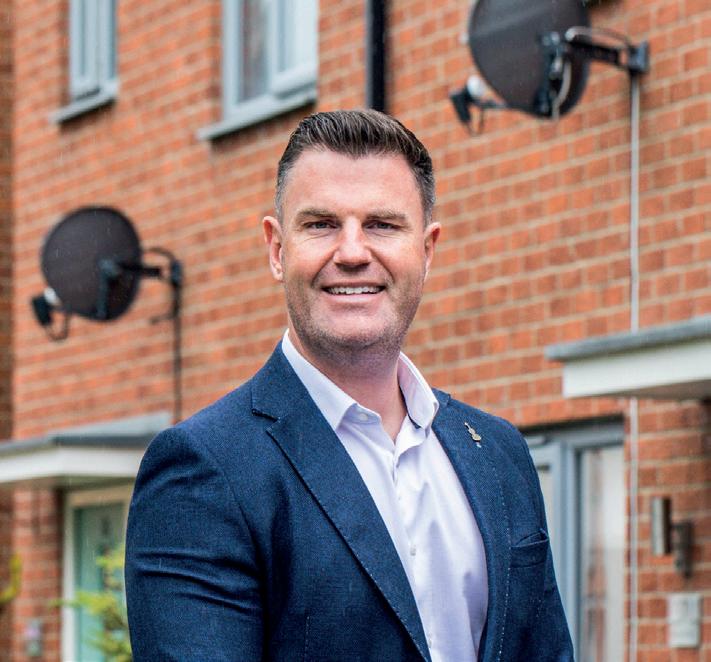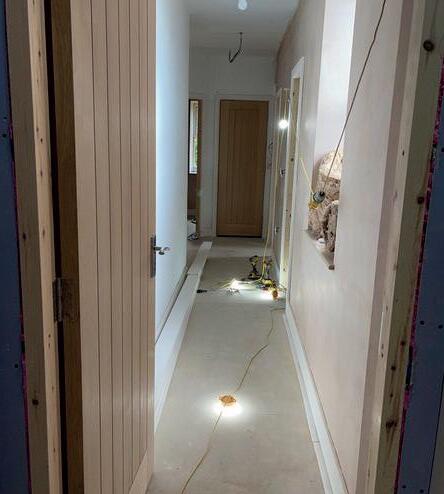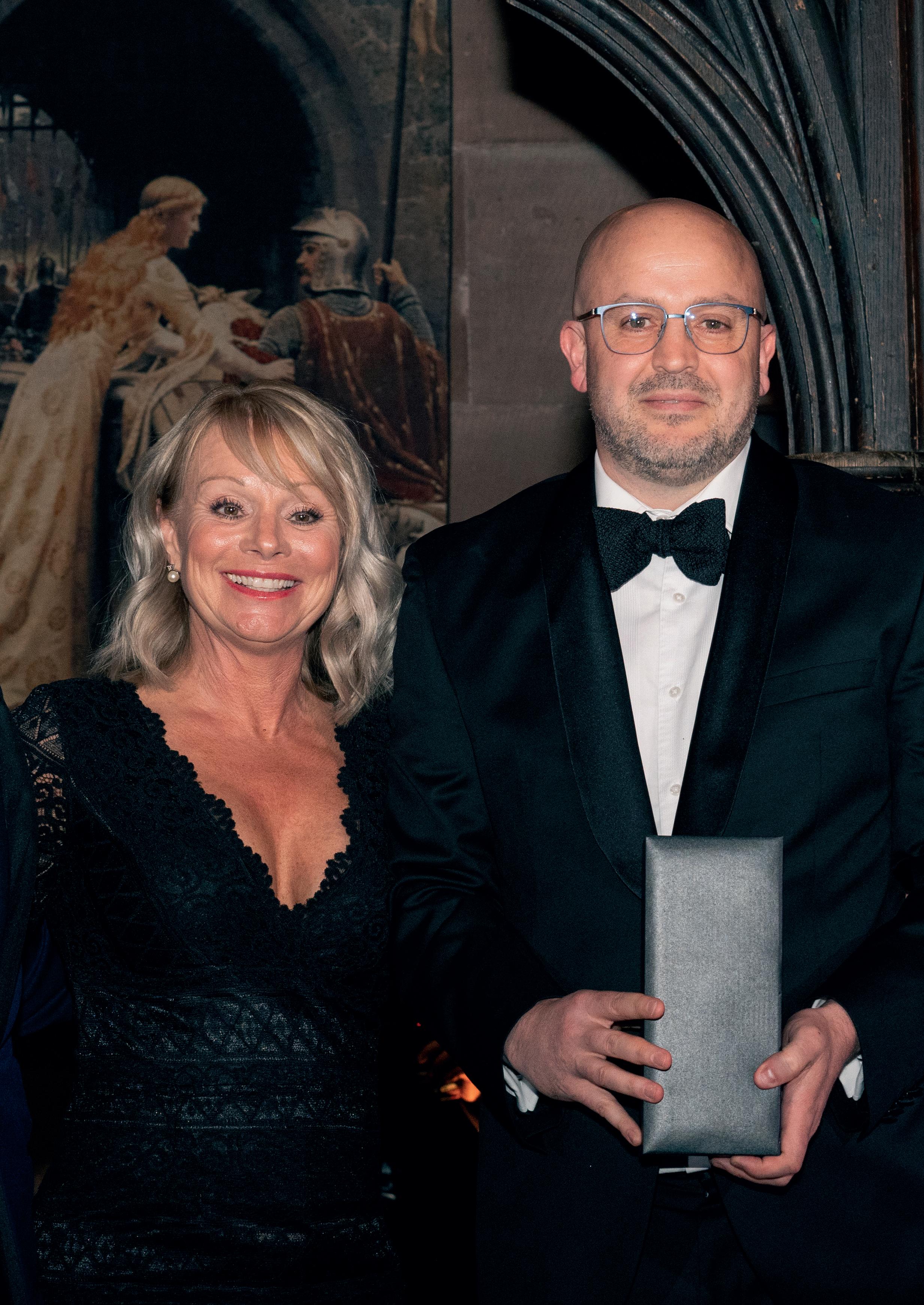








Wendy Whittaker-Large
Wendy details her story of changing the law for landlords regarding council tax banding for Houses in Multiple Occupations (HMOs). In this article, Wendy also shares the potential changes that could be coming for HMO landlords.

P.35
Ben Quaintrell
Experienced letting agent, Ben Quaintrell, shares his guide on dealing with difficult tenants, the legal procedures you need to follow, why Section 21 might not be as bad as you think, and the things you can do to protect your income and assets.

P.16
KoMo Properties:
Winners of the Deal of The Year Award, KoMo Properties, break down the fantastic deal that won them their trophy. This case study will both inspire you and give you some useful pointers for your next project. P.45 P.20

Chris & Jo Phillips
In this article, the dynamic Yorkshire duo share the deal that won them the Commercial Conversion Award: 1024 Manchester Road. This feature delves into the trials, tribulations and financials, alongside what made this such a fantastic investment opportunity that added seven properties to their portfolio in 12 short months,
P.13
The Market Pulse
Stay ahead with the latest market updates and industry news.
P.14
Caroline Pattinson
Caroline is renowned for the beautiful co-living spaces she creates in and around Chester. In this article, she shares how she invests differently from many other HMO landlords, and how this has increased her rental income and removed voids.
P.18
Lisa Brown
Supported living is a growing strategy that benefits local communities and offers financial incentives for investors. In this article, Lisa shares her guide to supported living and explains how it differs from social housing.
P.26
Mark Lloyd
Experienced investor, developer and mentor, Mark Lloyd, shares how you can find more investment opportunities, make them stack, negotiate on them and maximise their value.
P.24
James Rogers
The man behind one of the UK’s fastest-growing property networking events, James Rogers, shares his advice for networking and how you can maximise the connections you make when attending events.
P.29
Tina Walsh
In this article, Tina breaks down the ABCs of material information. This article is vital for both sourcers and investors who want to stay on the right side of the law and protect their finances.
P.32
Savoys
Savoys share their advice on how you can add value to your property deals post-election.
P.35
Nigel Bowers
Nigel shares the often-missed advantages of using a finance broker, and why having one in your ‘power team’ is vital for your property business.
P.38
Guillaume Black
Artificial intelligence and developments in property technology (proptech) could change the industry as we know it.
Guillaume shares the ways he expects the industry to change, and how investors can prepare.
P.41
Reginald & Nana Branche
Winners of The New Investor Award, Reginald & Nana Branche, share their story of how they got started in property, and their advice for success in the industry.
P.43
Sarah Czuba
Supported living investor Sarah Czuba shares the details of one of her first supported living deals, highlighting the financial and ethical benefits of investing in this strategy.








Ben Quaintrell
Winner of the Service Provider Award
Ben has been a letting agent for 15 years, eight of which he has run his own business, My Property Box, a forward-thinking, tech-embracing letting agency. He’s an active property investor specialising in singlelets, commercial and serviced accommodation.
Caroline Pattinson
Winner of the Co-Living Award
Caroline is a double award-winning landlord and Director of Chester Homeshare. Caroline specialises in providing homely, luxurious and sociable co-living homes to graduates and young professionals.
Winners of the Commercial Conversion Deal Award
Chris & Jo are established property developers who take pride in bringing old, run-down buildings back to life. The married duo is passionate about helping others, making a difference and creating beautiful places to live.
James Rogers
Winner of the Property Community Award
James is an experienced property investor and father of two great girls. James is also the founder of Property & Poppadoms, one of the largest and fastest-growing property networking events in the UK.
Kim Ospzala
Winner of the Deal of the Year Award
With her husband Mike, Kim is the co-founder of KoMo Properties, a property investment company specialising in acquiring and repurposing properties to create unique, amazing homes. Kim is also a multi-award-winning corporate solicitor with extensive experience advising on all areas of company and commercial law.
Brown
Winner of the Property Paragon Award
Lisa specialises in developing Supported Living Properties for people with support needs. Passionate about improving the standard of supported living property, Lisa is developing ways to make it easier for providers and property investors to connect, to create more homes for those who need them most.
Winner of the Best Training Provider Award
Mark has been investing in property since 2005. He is the co-founder of Property Master Academy, a mentoring and training company and has a background in a range of property-related businesses, from finance to crowdfunding.
Bowers
Nigel has been in the finance industry since joining Midland Bank over 40 years ago. Founder of Oxygen Business Finance, he is all about the conversation to fully understand the issues at hand and use all his experience to find a finance solution that works.







Winner of the Protech Award
Guillaume is an experienced investor and co-founder of Property Filter. Property Filter is a revolutionary piece of proptech that is helping investors find, assess and do more deals faster. It helps you focus your time having the right conversations with the right vendors and do more deals.
Winner of the New Investor & The Community Contribution Awards
Nana is a multi-award-winning property consultant and interior designer. With a background in fashion design, she co-founded a consultancy service that helps clients achieve their property goals.
Winner of the New Investor & The Community Contribution Awards
Reginald is a multi-award-winning property consultant, and investor, who transformed his life from adversity to success. Born amidst the civil unrest in Sierra Leone, he now helps others along their property journey through property consultancy. With a passion for serving in the community, Reginald is dedicated to inspiring and empowering individuals.
Winner of the Ethical Investor Award
After investing in property for many years, Sarah became a supported living landlady in 2021 when she completed her first commercial conversion, turning a veterinary surgery into a 6-bed HMO for supported living purposes. In addition to being a business owner, Sarah is a mum of two young boys who are her biggest “WHY”.
Tina developed a passion for law during her time as a police officer. So, when she moved into property sourcing, she was surprised at how unregulated the sector was. Tina has since made it her mission to raise standards for property sourcers and protect property investors from rogue agents.
Malkit and Sanjay are multi-award-winning developers from Savoys Properties who have been in the industry for 20 years. They specialise in HMOs/conversions and have won awards in three categories at the Property Investor Awards 2020 and 2021.
Winner of the Property Person Award
Wendy is a high-end HMO investor, two-times author, public speaker and mentor. Alongside being known as an experienced investor, Wendy is also positively recognised for her involvement in making HMOs single-banded for council tax.
The Blue Bricks Property Awards. One year of solid planning for one evening of excellence. It was a lot of work. A lot of work which paid off for an unforgettable evening that was loved by our 250 guests on the 19th of June at Peckforton Castle in Chester.
But why did we do it? Why run a property awards ceremony? We’re not the first. We won’t be the last. So what sparked this mission?
Landlords Are Bad People (So We’re Told)
I am sure that you, like me, are drained by seeing how landlords are portrayed in the media. It’s endless negativity. Landlords are bad. Landlords are profiting from others’ misfortune. Landlords are responsible for the housing crisis.
Etcetera, etcetera, etcetera.
But what can we do to push against this? How can we prove that there is good in this industry? That there are incredible landlords who are bringing beautiful homes to the market?
My answer was to create an awards ceremony dedicated to ethical investment. To award investors who were contributing to social housing, creating beautiful properties, making a difference in their communities and generally doing good!
Many of our winners then wrote to their local newspapers, and were published, finally showing landlords in a positive light! It’s a small step towards our goal, but it’s a step nonetheless.
We didn’t just pick Peckforton Castle as our venue because of its opulence. We chose it because of its central location.
Don’t get me wrong, I love London. I’m from Yorkshire, so seeing skyscrapers and historic monuments in place of our gorgeous fields, views and sheep is a nice change when I visit the Big Smoke!
But investors are doing incredible things across the whole of the UK. Because of this, I wanted to make the event easier to access, hence why I picked a more central location.
And it worked! We had investors coming all the way down from Scotland and up from Cornwall to attend!
We were blessed by one of the three days in a year that we get good weather. The sun was cracking the flags, and Peckforton Castle was illuminated in all its beauty.
Guests crossed the drawbridge and entered the castle grounds.


Here, they were presented with a complimentary glass of fizz, and the chance to network and catch up with friends.
After this, we moved on to a tender three-course meal, wine, and some good conversation.
That was before the main event itself, the awards ceremony, held in Peckforton Castle’s Great Hall. Britain’s Got Talent Winner, Richard Jones, kicked off the event with mind-blowing magic and helped to alleviate the nervousness of our finalists, while entertaining guests.
Finalists waited in nervous excitement while myself and Hayley Andrews took to the stage and began announcing our winners. Winners who you can read about in this issue.
Then, to finish it off, we set off the strobe lights and had one huge party! From that point on… my memory grows a little fuzzy.
Thank you so much to every person who attended the evening. Thank you to our incredible judges for believing in us and taking the time to judge the 150+ applications that we received.
But thank you to you. Because, even if you didn’t attend, the fact that you’re reading this means that you are supporting us.
Your support is what allows us to do what we do and try, like we do, to make a positive difference in our industry.
Finally, thank you to our sponsors: Roma Finance, Procurement 4 House Builders, and Cr8 Healthy Choices.
Very soon, we will be launching quarterly, UK-wide events for our members. We want to bring people together to share experiences, build relationships and help one another in the journey of property.
More details about this will be released soon, but if you’d like to be kept informed, email hi@bluebricksmazine.com to register your interest.
Sam Cooke Editor of Blue Bricks Magazine hi@bluebricksmagazine.com
Ahuge thank you to our incredible judges who took the time to filter through over 150 applications and select our winners. Without them, the night wouldn’t have been possible, and we cannot thank them enough for their support.

Malkit Purewal & Sanjay Kumar Savoys Properties
Malkit and Sanjay from Savoys are Watford-based developers with over two decades of experience in the property industry. The team have completed multiple commercial conversion and HMO projects, now managing over 200 tenants.
As the official sponsors of Watford Football Club, they’re a large and growing business with a positive reputation in the industry.
Savoys are bringing their experience to the table to judge which deals and individuals are suitable winners for our award categories.

Liz Baitson High Net Connect
Founder of High Net Connect, and Co Founder of Elevate, “The Ultimate Property Finance” event as well as multiple business networks.
Liz began her journey as property investor before advancing to co-found a bridging lender. Property is a “People Business” and so she continued her career focusing heavily on connecting people in this industry with peers of high integrity and skill.

Kam is a professional property investor, published author and the founder of Premier Property Education, a training provider dedicated to helping people gain the skills and confidence they need to start investing. Kam is also the founder of Premier Portfolio Builder and the Premier Property Club.
Kam has vast experience in almost every investment strategy, making him the perfect judge to analyse award submissions.
SKY TV’s very own Helen Chorley from Property Elevator is no stranger to judging award submissions.

As an angel investor, Helen regularly analyses deals and people to decide whether a project is a worthwhile investment.
Helen is bringing her vast experience in the industry to the table as a judge, carefully analysing submissions to ensure that finalists are the right fit for their awards.

Ryan Windsor & Giovanni Patania
Windsorpatania Architects
Windsorpatania Architects is a multi- award-winning architectural firm that specialises in working on high- end luxury properties.
The team know the inner workings of property deals, being able to carefully analyse investments to see where value has been added.
The team will be judging award submissions, offering a unique angle to the process that will highlight the success of our winners.
Honored with the British Empire Medal in 2023 for her contributions to business, Liz’s mission is to facilitate excellent relationships that evolve into awesome business.
Charlotte Edwards Dennis Edwards Homes
Charlotte is a renowned property developer and business owner.

Using her talents to inspire more women to enter the property industry, she has picked up a strong following online under her title ‘The Accidental Female Developer’.
Charlotte’s company, Dennis Edwards, builds beautiful homes in desirable locations.
As a highly experienced property developer and mentor, Charlotte knows what to look for when judging award submissions.
Hayley is an experienced property investor having participated in almost every kind of investment strategy.

She is also the co-founder of Your Freedom Empire, an award-winning property training company, and a host on Property Elevator, a series on Sky TV.

Change Ahead delivers safe, sustainable housing and improved well- being, whilst empowering people to lead independent lives through training, education, and employment.
Mohsin co-founded social enterprise Change Ahead, following more than three decades of experience in property, finance, healthcare, marketing, and advertising.






















Sam Cooke | Editor of Blue Bricks Magazine.
Lately, I have gotten into the habit of filing my completed tasks away, rather than deleting them once they’re finished.
Why? Because it’s easy to get to the end of a week and feel like you haven’t achieved anything.
Then, when you look at your completed tasks, you realise just how much you’ve gotten through!
I’m mentioning this because so much has happened since the last issue of Blue Bricks Magazine.
Yet, at the same time, it feels like I only need to blink, and the next issue is upon us!
I suppose the elephant (or castle) in the room that has changed everything is the Blue Bricks Awards, a luxury event where we had 250 of the industry’s finest celebrating in a castle.
Words can’t express this experience, so I’m hoping this issue of the magazine can do it for me.
When I say this issue is dedicated to the awards, I don’t mean talking about the evening. Instead, what I wanted to do was put a spotlight on our winners, and showcase why they won.
The features in this magazine are nothing short of inspiring.
If you read the articles following this page, you’ll also pick up a wheelbarrow full of golden nuggets that will help you find more deals, invest in new strategies and prepare for upcoming changes in the industry.
The next page will also tell you a little more about the awards, like why it was created, and our mission at Blue Bricks Magzine.
So, What’s Inside?
A bit of everything! We have some brilliant case studies from Chris & Jo Phillips, winners of the Commercial Conversion Award, and KoMo Properties, winners of the Deal of The Year Award.
We recently sent a survey to our readers, and one of the things that came back was that people are struggling to find deals in today’s economy.
The subject of finding deals that stack, offering on them and adding value is covered in-depth by Training Provider of The Year Winner Mark Lloyd.
We also have Wendy Whittaker-Large returning to share with you what the future holds for HMO landlords. This is a great read that will help you prepare for upcoming changes.
I’m also excited to share with you the story of Reginald and Nana Branche, winners of the New Investor of The Year and Community Contribution Award, alongside their advice for success in the industry.
There’s a lot to dig into here, so I won’t keep you any longer.
I welcome you to share a picture of you reading Blue Bricks Magazine on social media and tag us at @bluebricksmagazine.
We’ll be sure to reshare this to our network for you.
If I can help you with anything at all, then please do not hesitate to get in touch.
Until the next issue, always yours, Sam
Cooke, Editor of Blue Bricks Magazine. hi@bluebricksmagazine.com

























Experience 4x growth with multiple properties and multiple cash flows from every deal you do. Title Split is the strategy of 2024.

With our guidance, achieve a 25-35% capital uplift, ensure mixed assets for stability and master MIMO on every deal.

Do you want both cash flow and equity growth in your portfolio?
Want to diversify your portfolio, secure your future and maximise returns?
Are you looking to turbocharge your cash flow in today's market?
Access the FREE Title Split Video for Blue Brick readers. Discover ideal properties & achieve maximum cash flow and equity uplift. Scan the QR code to download.
Rachel Knight, our dynamic Property Developer since 2005 & Title Splitting expert, leads a Power Team of experts dedicated to helping you maximise your returns with Title Split.

Labour’s takeover of the UK government is set to a rather sluggish property market, according to a recent report from the Royal Institution of Chartered Surveyors (RICS).
And the news can’t come quick enough, following what can only be described as a ‘stagnant’ summer. New instructions for surveyors were down 7% in June, while Halifax had the average property sitting at £288,455, in the same month. That figure was down 0.2% on the previous month. Nationwide listed the average property for May–June, at £266,064.
Property Sitting Stagnant Amid Holiday Season and Prospective Political Upheaval
The latest Zoopla house price index, reveals property inflation was at 0% in May, compared to the same time a year ago. Analysts report that prices are beginning to pick up though and are expected to reach 1.5% growth, by the end of the year.
There was no surprise in the most and least expensive areas of the country. Halifax’s monthly survey put the southeast of England as the second most expensive area in which to buy property after London. The average price there was £385,056. Conversely, the northeast was the most affordable, with property there averaging around £172,308.
more efficiently and to help tackle the current backlog of applications. Labour’s current ambitious plans are for 1.5 million new homes by 2029.
At the same time, lenders buoyed by the new government, have begun to reduce mortgage rates, encouraging more buyers to dip their toe in the market. Barclays slashed 0.27% from a number of fixed rate mortgage products, while Santander cut theirs by 16%.
The Leeds Building Society and Halifax also cut various mortgage products by 15%.
But others cautioned on ‘over-enthusiasm’, when it came to the prospect of the Monetary Policy Committee (MPC) of the Bank of England, reducing rates on any grand scale. Some economists predict the base rate may only fall to 4% in 2026 (it’s currently sitting at a 16 year high of 5.25%).
MORE INDIVIDUALS, COUPLES AND FAMILIES ARE SEEKING TO PRIVATELY RENT THAN BEFORE, WITH A JUMP OF 1.5%. MANY ARE NOW OPTING FOR CO-LIVING MODELS.
With Labour, come hopes for a lower interest rate around autumn time. And that in itself, should increase interest approvals and enthusiasm for the sector. The new government has already agreed to extend the mortgage guarantee scheme. One of Chancellor Rachel Reeves first announcements, was on restructuring the planning system, making it easier to build homes. She also promised the appointment of 300 new planners, under her ‘prioritising property agenda.’ This is in an attempt to get house building plans through

In the meantime, Amanda Bryden, the Halifax’s head of mortgages, said more properties were needed to satisfy demand. She added: “For now, it’s the shortage of available properties, rather than demand from buyers, which continues to underpin higher prices.”
She was confident that mortgage costs would come down, thanks to a lowering of interest rates; subdued growth in house prices and inflation falling, in relation to rising household incomes. UK inflation was, in fact, at the Bank of England’s target 2% rate in the spring, prompting many in the industry to predict a cut in mortgage rates as early as August.
Mortgage approvals were down to 60,000, in May. This compares to two months previously, where 61,086 applicants go the go-ahead to buy. Remortgages had also fallen, albeit by a lesser 300 applicants in May. Five years ago, in May 2019, a total of 65,340 mortgage approvals were given out.
More individuals, couples and families are seeking to privately rent than before, with a jump of 1.5%. Many are now opting for co-living models.
These are particularly popular in large cities, such as London, Birmingham, Manchester and Liverpool. In fact, the build-to-rent (BTR) sector, increased by 38%, year on year, between April to June. Investment for the first six months of 2024, was £2.6bn.
That’s according to the latest Knight Frank update, which puts single family housing as a key growth area. At the moment there are a total of 114,207 completed BTR homes in the UK, with 11,000 completed this year alone.


Caroline Pattinson Best Co-living Accomodation
“My team at Chester Homeshare and I, were super-proud to win the best co-living accommodation provider award, at the Blue Bricks property awards at Peckforton Castle, last month! Here’s what led us to that point.“
The biggest turning point of my business life was my transition from banker and landlord to business owner. A transition where, rather than seeing the people who lived in my properties as tenants, I instead began to see them as customers.
But why was this such a turning point? Since I’ve upgraded the standard of my HMO (houses in multiple occupation) properties and put a strong focus on customer experience, I’ve doubled the size of my business, added pride and purpose to it and, with my whole team, won multiple awards.
We now run a property portfolio that meets my strategy of zero voids, zero arrears and pays 30% above market value rent.
I am currently undertaking an enormous refurb on an 11-bedroom, ex-nunnery, as I expand from Cheshire into North Wales, in an area that people said: “you’ll never make a success of that there!” The house is still a building site and yet, on the strength of my brand, half the rooms have already been booked, collecting record high rents for the locality, with an impending rent roll of over £100,000, on just one property!
This is my advice on flipping your mindset and turning HMO investments into co-living homes. An approach that will help you make more money, have fewer void periods and result in headache-free tenant (or customer) management.
For many years I held a senior position at NatWest Bank. It was a well-paying job, even if it did come with long hours and a lengthy commute from Chester to London.
While I kept this career, I invested in HMO and SA (serviced accommodation) properties on the side, building up a portfolio just a stone’s throw from where I lived, as well as abroad.
As much as the additional income was welcome, my portfolio was not run as a professional business, just as a landlord to tenant, like many people do. Some of my tenants turned out to be nightmares; I’ve dealt with everything in my time. From tenants who were inviting friends around to take drugs together, to one tenant who I had to evict, who kept two baseball bats and a fake gun under his bed!
Rather than ‘financial freedom’, all my portfolio brought me, was a lot of work.
While dealing with a demanding career, difficult tenants, a divorce and three children, it was taking a toll on all areas of my life.
Because my job was in London, I didn’t have time to manage the property portfolio and see my three children enough.
This resulted in me choosing to quit my high-paying job to find something more flexible. I looked at selling my property portfolio, but soon realised that after paying off the mortgages, tax and legal expenses, I wouldn’t have enough money left.
So, I decided to make a change and go into property full-time, and that was the beginning of both my life and business transformation.
I had the idea that if I could improve the quality of my rooms, I’d attract a different demographic of tenants.
A trip to the paint shop led to me meeting my now permanent team member and good friend, Laura. Laura found me buying paint and we got chatting. After she asked a few probing questions, I explained all the problems I was having.
An interior designer by trade, she offered to help me and together, we set to work transforming one of my HMO properties into something high-end and beautiful.
Doing the property up, I wasn’t convinced that our plan would work. I was getting £450 per room at the time and I couldn’t envision anybody wanting to pay more than that. Raising them to £650 felt like a huge leap.
To my surprise, my new rooms began ‘flying off the shelf’, and we had no grumblings about price! Many of my new tenants were young people leaving university and figuring out what to do with their lives. They started a new job in a new city and wanted somewhere nice to stay. Above that, they wanted friends.
This sparked my desire to fill my HMOs with like-minded people who I knew would get along.


This bred friendships and created communities, where people loved to live (and were happy to pay for). The changes in my life, meant I wanted to make a positive difference for others and the feeling that gave me was worth just as much as the increased rental income.
It’s nice to ‘do good’ with your business, but ultimately, it is still a business. That means making money.
To show that this strategy makes good sense commercially, I have included a quick breakdown of the benefits I have seen in my portfolio:
My properties receive 30% above market-rate rent. I have tracked this with SpareRoom data, so I know it’s accurate.
I have massively Increased the value of all my properties, especially with commercial mortgages, when accounting for the higher rent roll.
I have no hassle with my tenants. Everyone pays on time and I regularly get glowing, 5* reviews on my Facebook and Google pages @chester homeshare.
My portfolio operates at 100% occupancy.
I have a waiting list of tenants, eager to live in one of my HMOs and my customers often tell my team or me, that they are happy where they are.
Part of the way that I have achieved these results, is through my referencing process. I have a set of questions on my listings that I ask tenants to answer. This includes things like their job, interests, age and what they want from a house share.

I run an anti-loneliness strategy across my business. My typical customer is aged 23-24, who has moved to a new city for work and doesn’t really know anyone locally. I’m like a property matchmaker. Rather than throwing any paying customer in an HMO, I carefully select people who I feel will connect with others in the house, feel comfortable and even make friends. I’ve seen HMOs before, where you have young students mixed with old contractors…it does not work.
I also run two events a year for all my customers. We do things like a cocktail masterclass and I’ll put some money behind the bar for them. Customers from all my properties get to mingle and meet each other, which I have found to be another great way for people to make friends and build relationships.

It also creates customer loyalty for my business. this is my ‘stay and pay’ strategy – happy customers stay longer and pay on time, as they value where they live.
I really believe, that as landlords (I prefer the phrase ‘property provider’) we have the ability to positively (or negatively) impact someone’s mental health and well-being, and I speak all over the country advocating for raising standards in the private rental sector.


If someone messages something along the lines of, “I’m looking for a sociable house, where I can make new friends, but also have quiet time when I need to work,” then that’s perfect, and I know they’re the right fit.
A few years ago, I set myself a massive goal – to increase my income tenfold, in just five years. I almost bailed as I wrote it down. At this point, I was on a low income, having left my career and forced to give some of my properties away as part of the divorce, so ironically, I was unable to get a residential mortgage. Absurdly though, I could still get buy-to-let mortgages, but that’s just the way they’re calculated.
If I achieved my goal, that would be more money than I’d ever earned in my life. And that’s something the little voice in my head reminded me of constantly, trying to tell me every day that it wasn’t possible.
I achieved my ambitious financial goal, not in five years, but in just two-and-a-half years, through sheer hard work, belief and determination! And I have carried on expanding since.
The point is, that we all have that little voice. The one that tells us we can’t achieve our goals. I have found two pieces of advice that remove this voice:
Don’t accept mediocrity – set what you want and graft relentlessly. CTFO (Crack the F**k On!) through the hard times and the success.
I hope you enjoyed this article, and that it gave you some inspiration, on how you can increase income, pride, performance and retention, from your HMO co-living properties.
chesterhomeshare

After featuring in the last issue of Blue Bricks Magazine, we are delighted to be back again, to write about one of our favourite deals. This deal won us a trophy for ‘Deal of the Year’ at the Blue Bricks Property Awards, both for its profitability and the creativity with which we managed to put it together with the landlords.
Through some tough negotiations and creating win-win solutions, we managed to secure this six-bedroom HMO (house in multiple occupation) as a lease option and convert it into the jewel of our HMO portfolio.
We hope that this article serves as inspiration for your next project and helps you to avoid some of the difficulties that we faced throughout the deal.
We secured this six-bedroom, existing HMO, through a purchase lease option, in February 2019. The landlord approached us, in response to our direct-to-vendor letters, in 2018 and they originally contacted us to take on the property on a rent-to-rent basis. They had retired abroad and were struggling to manage it from overseas. At the time we viewed it, only two of the six rooms were let.
Unfortunately, the rent they wanted was too high to make it work for us, so we were not able to secure a deal. We followed up regularly and during one of those conversations, we found out that they actually wanted to sell, but had an early repayment charge (ERC) so couldn’t.
Kim then had an ‘aha’ moment and changed the discussion from rentto-rent to a purchase lease option (PLO). This worked perfectly as the landlord would have fixed income and day to day management until the ERC ended. As it was a lease option, we could increase the monthly payment we were willing to pay.



The lease option was conditional on planning permission. Although the property had operated as an HMO for a few years and had a licence, it is located in an ‘article 4’ area and did not have planning. We applied for planning on behalf of the landlord and obtained C3 to C4 planning permission, in April 2019.
The Terms of the PLO:
Rent: £1400pcm.
Option: We could exercise the option and buy the property from years 3-to-5.
Purchase Price: £310,000 but 50% of the monthly rental payments would be deducted from this price.
We love PLOs because they are just a commercial agreement between two parties and it is between you to agree on terms.
The terms we agreed on were a true win-win for both parties!
In 2019, once we had planning, we carried out a light refurbishment of the property and then operated it on a rent-to-rent basis for three years. At the time, two of six rooms were occupied by working professionals, so we refurbished the property and let out the remaining rooms. In 2021, we changed the property to a student let.
We always knew if the market were good, we would exercise the lease option as early as possible.
We knew we wanted to increase the number of bedrooms, so a few months before the third anniversary of the PLO, we submitted planning to change from C4 (six-bed HMO) to Sui Generis (seven-bed HMO).
Unfortunately, the planning application was called to committee by a couple of counsellors, who raise exactly the same objection to any HMO applications made in the area. We were travelling Europe in our
campervan at the time, so I had to fly back to speak on our behalf. It was successful! We purchased the property in cash using a private angel investor, who received a fixed interest and was first charge against the property. We funded the development from our own funds.
We carried out a full refurbishment of the property including: opening up the kitchen and conservatory (and replaced the roof) to create an open plan kitchen diner,adding three ensuites: the property had two bathrooms for six occupants and we increased it to five bathrooms for the seven occupants, restoring the original Minton tiles discovered under the carpet,creating a cinema room: this added almost 50% more communal space, by converting the basement into a cinema lounge,converting the previous lounge into a large, ensuite, studio bedroom and at the same time, increasing the size of bedroom two.
The interior design of our property is quite innovative, our summery, warm brand colours (greens, corals and yellows) are unique and inspired by Kim’s Caribbean heritage and our European campervan travels.
Another unique element is how we have embraced the Victorian features in the property. For example, we had the Victorian tiles in the hallway refurbished and kept all of the original chimney breasts, using the alcoves to create bespoke storage.
We also kept the ceiling roses, accentuating them in our design. Since the property refurbishment finished, we have had 100% occupancy. This is a student property, so it has 364-day tenancy agreements.
Monthly rent:
£1400.
Profit per month for the lease period (net average): £472.
Purchase price: £310,000 less 50% of the rental payments for the prior 36 months. When we purchased it in July 2022, the purchase price was reduced to £282,382. All completion costs: £299,812. Build and
£28,000 left in the deal meaning a ROCE (return on capital employed) of over 88%. Annual rent 2024–25: £56,000 minus the annual expenses of £28716 equalling £27,284 net profit per annum.
This deal was a real win-win for us and the seller.
The seller had hands-off management and guaranteed income until his mortgage ended; we had secured a pipeline and income stream in the meantime.


We had three challenges with this project:
Negotiating the lease option—This took several months of negotiation, with a lot of going back and forth.
As Kim is a lawyer, she was able to explain how a lease option works in simple terms. Once the seller was on board, it was important that their solicitor is experienced in lease options.
We suggested three different solicitors, who had been recommended to us by property investors.
Sui generis planning permission—despite there being no neighbour objections, our planning application was called to committee.
Refinance—the development finished and our refinance started, just as Liz Truss became PM.
We had secured a rate just before this, but the lender was dragging their feet throughout, so the refinance took almost six months.
Follow up – it took several months of conversations before a deal was reached.
Listen – when a vendor or agent is explaining the situation, think about whether a creative solution could work.
We hope that this article has given you some inspiration for your next deal and shown you the power of lease options.
To learn more about us, or to get in touch, connect with us on Instagram, or reach out using the details below.
info@komoproperties.com komoproperties https://komoproperties.com/


Wednesday 4th September 2024 10:00 - 15:00


significant shortfall of 4.3 million homes, it’s imperative that we unite to propel the United dedicated to serving the British
developer market. With a





Kingdom forward and address the pressing need for more





Supported living has suddenly become a bit of a buzz word, but what I am seeing is lots of people talking about it, but not really understanding what it is.
I am seeing property investors use the terms ‘supported living’ and ‘social housing’ interchangeably but in fact, they are not the same. In supported living the tenant has a support need, they require some degree of support to be able to maintain their tenancy and live their life.
This may be a short-term support need, maybe someone who is a domestic abuse survivor, a young person leaving the care system, a veteran who has PTSD (post-traumatic stress disorder) or someone who has been sleeping rough; with these tenants the support will be aimed at helping them get settled and learn the skills they need to be able to move on to take an independent tenancy.
Or the support need may be long term, someone with a learning disability or autism, an enduring mental health issue or a physical disability; with these tenants they need a home for life and will usually need support for their lifetime.
There are tenants with a wide range of support needs and consequently a wide range of properties are required to meet this need.
In supported living it is usual for an organisation to take a lease on the property, not the tenant themselves, this organisation – the supported living provider, can take many forms, it could be a charity, care company, housing association or community interest company.
They will lease the property for a number of years, they will usually cover any voids, wear and tear, cover much of the maintenance and manage the property on your behalf.
This creates an amazing way to hold property for the long term, in a hands-free way while creating homes for people in our society who need them most.
Once property investors understand how powerful this can be, I see them getting excited about supported living.
What I see though, is property investors who have heard from ‘Colin-down-the-pub’, that they can get 25–40-year leases; that they can
get very high rents and they expect supported living providers to offer crazy rents for their poor-quality house in multiple occupation (HMO) in the roughest street in Birminham!
They get disappointed when I explain than no decent provider will put tenants with a support need in that area, yet alone pay you anything like the rents they have heard people talk about, and due to regulator changes, the lease offered may be more likely to be 3–10 years.

Once you understand it properly, you will see how supported living can be a great way to hold property for the long term, at market rent or even local housing allowance rates, most of my landlords end up being net better off, when leasing a property to a provider, and the fact the provider manages the tenants, covers voids, property maintenance and repairs, means it can save you significant time.
You may not be offered a 25-year lease but a quality provider offering you a 5-year lease, with the intention to keep renewing it, so that a tenant can have a home for life, gives you a secure long-term investment.
But it takes time to find and build the relationships with the right providers; to understand their needs, locate the right property to meet those needs and then develop it, negotiate the rent and lease, and hand the property over.
Leasing a property to a supported living provider is an amazing way to make an impact while creating long-term stable income for yourself, but it is not a simple process, despite what you may hear from ‘Colin-down-the-pub’!
I have been exploring solutions to the issues around supported living for quite a few years now. I am approached by many providers who are all struggling to get the property they need, for the people they support.
I am frequently told that the biggest issue they have is finding the property they need and the lack of property is stopping them from supporting more people.
There is over two thousand people with a learning disability and or autism, who are stuck in hospital, unable to return to their communities, and for many of these people the barrier is that there is not the right property for them to move into.
I have always felt that private property investors were part of the solution to this shortage and for years I have been raising awareness of supported living among property investors.
I set up The Supported Living Property Network, just over 18 months ago, as I felt there was a way to do things differently.
I saw there was a need to help providers and property investors understand each other better. I wanted to see what would happen if we brought them together into one community.
The results have been amazing, and I am so proud of the unique community we are building.
We hold monthly training sessions, where we cover subjects that help everyone keep up to date and compliant.
We have monthly online networking events, to help build relationships.
We have a member only community and have just developed property and demand portals, so property members can showcase their property for providers to see and where
providers can list where they need property, so property investors can respond to that demand.
We have now held two, member conferences, where we have a room filled with provider and property investor members, all connecting and building relationships and our next one is planned in Birmingham.
We do not ask members to sign restrictive legal agreements or charge introduction or sourcing fees, the Network is all about encouraging members to connect and work together; to solve the problems we have around the lack of homes for people with support needs.
I realised that there was a need for people to have access to reliable training, so they could understand supported living property better, so I developed high quality CPD (continuing professional development) accredited training courses, for both providers and property investors, and I offer some small group coaching, for those who want support, as they build their supported living portfolios.
I think it is important people get accurate information about supported living.
I wanted to counteract all the myths I was hearing about supported living on social media, so I have created a website, with a lot of free content to help everyone understand supported living property better, you will find videos, podcasts, blog articles and free guides to download on the website.
www.supportedlivingproperty.uk
There are challenges in supported living. It can take time to set up a property, get all parties agreed and leases signed, but when you look at the long-term time saving, over the length of the lease, it is well worth it.

There are fewer mortgage products that allow you to lease a property to a supported living provider and mortgages tend to be more expensive.
I have been actively campaigning on this issue, as I feel this is often due to a lack of understanding by lenders. As The Network is growing, so is the influence we are having.
I have been asked to write briefing documents to government on the issue of mortgages and proposed solutions to improve matters.
We are presenting case studies of the work we do and homes we have created, on NHS England forums, to help commissioners and local authority staff understand how to work with property investors.
There is a lot of work to do but it is great to see the impact we are having already.
I am passionate about the impact property investors can have, by taking time to understand how to do it properly, we can create long-term, cash-flowing assets that create homes for people with a support need. It is a privilege to be able to make a difference to people’s lives in this way and is something we all can do.
Thank you for reading, and if there’s anything I can do to support you, then contact me using any of the details below.
www.supportedlivingproperty.uk lisa_brown_property

Take some time out for you to work on your business instead of the day to day running of it. Spend 3 days in a luxurious 5 star converted mansion in the gorgeous Peak District where you will be treated like a queen, eat delicious food cooked by our private chef, be surrounded by ambitious business women and have some invaluable “me” time. You’ll leave feeling empowered with an actionable plan to finish Q4 with a bang!















When we were gifted a trophy at the Blue Bricks Property Awards for our commercial conversion in Huddersfield, we were blown away.
1024 Manchester Road has been the jewel of our property portfolio since its completion. It was one of those deals that just stacked, bringing us home a nice profit, without eating up years of our lives.
That said, it was a project with its fair share of unforeseen hiccups and challenges that reared their head during the refurbishment.
We hope that in reading about our deal, you learn from some of the errors we made (which will save you a good amount of money) and pick up some golden nuggets that help you with your next development.
Before we jump into the nitty gritty, let us give you a quick overview of the development: an old commercial property, spread across three floors, that we planned to convert into five,two-bed flats and two commercial units.
The property was a curry house on the ground floor, with one floor stationed above it and a one-bedroom dingy flat on the lower level below.
On the ground floor was a kitchen and dining area.
Then, on the first floor, was a nightclub…which (like the rest of the property) had seen better days.
Our idea was to convert the ground floor into two commercial shopfronts, with a two-bedroom apartment to the rear. We then wanted to install a staircase between the shopfronts which led to the first floor, giving our residential tenants their own entrance.
Our plans for the first and lower floors were to convert them into four two-bedroom apartments (two apartments on each floor). Planning was approved for this scheme, which is what we eventually pulled off.
Now that the overview is out of the way, let’s get to the finer details.
The property wasn’t in the best of shape when we found it. But, like a Tardis, it was much larger on the inside than originally meets the eye, when you’re looking at it from the roadside.
We’re not entirely sure about the history of the property, but when we walked through the front door, we were greeted with at least one- to two-hundred letters of demand.
What we do know, is that the property was on with an agent and didn’t sell. It went to auction and didn’t sell. Finally, it was brought to us through a friend and property investor, allowing us to strike a direct deal at £160,000 (a purchase which we funded with investor finance).
We didn’t make an offer subject to planning, as we were certain that we would be eligible for permitted development (PD).
We knew that we’d have to apply for planning for the external changes (since the site was in a conservation area) which included repairing the roof as well as removing and installing windows. But, given we had PD, we were certain this wouldn’t be an issue.
Then we got the bad news from the local council. We weren’t applicable for PD rights because the area was in a HSE safety zone.
It turns out that ten years earlier, a chemical-factory fire had erupted.
The chemical factory was over a mile away from our site and the edge of the HSE zone, was literally on the other side of the street where 1024 Manchester Road resided! One street was the difference between PD and a full planning application.



My business partner has been developing properties for 20 years and he didn’t realise that PD rights weren’t applicable in HSE zones. So, learn from our mistake and make sure that you check this before purchasing a potential project. A quick check on your local council’s website is all it takes.
The application that we put forward for changes to the exterior of the property was accepted within one month.
Our five years of experience developing property told us that, since the exterior changes were approved, our application for changes to the interior was all but given.
So, taking a calculated risk, we commenced work on the exterior of the project, while we waited for confirmation from the council on approval of the interiors.
At least this way, work was still being done on the property and we weren’t sitting around waiting, losing money.
This work included: three additional windows at the front of the property on the first floor, moving one of the existing windows, so we could position the bedrooms where we wanted them and the installation of a new roof on the rear of the property.


This process took roughly two months and by the time it was over, full planning had been accepted by the local council (minus some minor tweaks to bedroom sizes and configuration).
The interior of the property was disgusting. There were old fridges from the curry house, piled high with rotten food. It was dark and dingy and the rear of the property was like a dungeon: you needed a torch to move around.
The nightclub upstairs hadn’t been used in years and was mostly empty. The people who had it previously had been using one of the upstairs rooms for storage, so that was packed, almost to the ceiling, with rubbish.
To get the project underway, we had to go back to brick and back to floorboard. We stripped out everything and had to do a full rewire.
Additional works included new joists above the kitchen, a new roof to the rear of the property and repairs to the roof at the front of the property.
Midway through the development, new regulations came in around insulation, raising the requirements from 50mm of insulation to 100mm, which meant our costs rose substantially.
Because we opted for electrical heating over gas, we had to go for the highest level of insulation to get our energy performance certificate (EPC) rating up.
It was worth the work, since the new EPC score is a C, securing us against any upcoming changes to minimum requirements for rental properties.
We opted for using steel framing over wood framing. This sped up our build time, as no wood meant we had no sawdust or mess to clear up. Although it’s slightly more expensive, steel framing worked out to be cleaner and quicker.
Our most expensive issue was the electrics. Manchester Road is a busy road, with a full parade of shops. This meant we needed threephase power to the building.
When we contacted the Northern Power Grid, they said we would overload their infrastructure and the only solution was to connect to a substation one hundred meters down the road.
This was a very large cost that we hadn’t accounted for. It meant digging up Manchester Road, which is high traffic at the best of times.
Needless to say, we weren’t very popular with the locals once the stop-and-go lights were installed.
Thankfully, even though we decided against gas, we budgeted for a gas connection at the start, so with this and our initial contingency, we had enough to pay for the works, without taking too much of a financial hit.
If you want some advice, then contact the power grid before you start your project!



The build process took ten months from beginning to end and was financed by our build partner, who had recently completed a separate project.
The result was five, beautiful, two-bedroom apartments.
Two on the first floor and two on the second floor, with an additional one to the rear, behind the commercial units on the ground floor.
Remember the dark dingy area that we mentioned? The one you needed a torch to move around in.
We got creative with this and added high windows, which meant the tenants had privacy to stop people from looking in and they got natural light.
This creativity (alongside a lot of damp proofing and membrane) allowed us to create the two ground floor flats. The curry house was converted into two commercial units, which we kept relatively empty, so that any business could move in.
The seating area and kitchen on the second floor became another two-bedroom flat, with the seating area giving plenty of room for two large bedrooms.
The nightclub and storage area were also converted into two, beautiful, two-bedroom apartments.
Our flats were rented almost immediately, but the commercial units took a little longer.
Commercial property was new to us and it’s something we’d wanted in the portfolio for a while. We decided that two commercial shopfronts were better than one big one, as they’d be easier to rent.
The shopping parade was run down with boarded-up shops, so part of our desire to add a commercial element, was to rejuvenate the
area and give opportunity to small, local businesses.
After two months, the shops did eventually go to two tenants: A beautician and a hairdresser. It turns out that they were old school friends and because the businesses complemented each other, they ended up passing and sharing clients.
The hairdresser has been so successful, that they’re now growing and hiring staff and the resulting additional footfall from customers visiting both businesses, has resulted in other companies along the parade, having more people pop in to buy their wares.
The residential tenants are also over the moon and after we accidentally bumped into one of them on the stairway, they told us how thankful they were to live in such a beautiful home.
Seeing the area come back to life and two tenants with successful businesses, is just as rewarding as the resulting profit.
Speaking of profit, below is a breakdown of the figures:
Mortgage (once refinanced) at 75% of £830k: £622,500
payments at 4.74%: £2,490
Monthly rental income from all units: £4,330
Less full management fee: £300 Cash flow after mortgage payment: £1,530
The beauty of this project is that we bought it in September 2021 and by the end of November 2022, we had refinanced everything but the commercial units and released our funds to repay our investor.
We bought our shares from our business partner, meaning it’s 100% owned by our portfolio business, CJ21 Properties, which added seven new rental units to our portfolio in 12 months.
More importantly than the financial gain, we brought a beautiful old building back to life, provided five new homes (without digging up fields) and brought people and businesses back to the shopping parade.
Making positive differences like this is why we do what we do.
If you’d like to connect with us, then you can do so by contacting us on the email below, or you can learn a little more about us by visiting our website.
cj21properties.co.uk chris.phillips@cj21properties.co.uk


I’vebeen to events, where the car park outside, looks like the start of a boxing match. Rather than happy faces, I’ve seen people sitting in their cars looking miserable, trying to psyche themselves up to enter an event, like it’s some fight arena.
Networking shouldn’t feel painful.
It shouldn’t be boring.
And, if done correctly, it should result in more clients, new partners, service providers or just good friends!
Here’s how to re-find your love for networking and get more results from the events you attend.
My networking journey started when I hosted the Stoke on Trent Property Investors Network (PIN).
I always had a good turnout and I put that down to the way I made everyone feel welcome.I wanted to put a focus on building rapport with attendees.
Sure, speakers are great (even though there are only so many HMO (houses in multiple occupation) case studies you can listen to!))
But I think the real value comes from the relationships in the room.

However, COVID ended our curry nights and we had to move our events online.
After COVID, I tried re-sparking the curry meet, but it never got the traction it once had. So, instead, I stopped hosting PIN and set up my own event, Property and Poppadoms: an informal property networking event over a curry.
Starting with eight people, in November 2022, I’ve now managed to grow to 26 events across the UK, with an additional two that we host online.
This rapid growth came from having an event that was easy to replicate: informal networking – an introduction – one keynote speaker (15 minutes) – then curry and some good ‘chaats’ (pardon the pun).
By the end of 2024, I aim to have 40 events across the UK.
This journey, the national community we have built and the rapid growth, are what contributed to me winning the Blue Bricks Property Award for ‘Property Community of The Year’.
My Tips for Successful Networking
Running so many of my own events, has helped me to pick up some tips for networking the right way.
Tips I have learnt from those who successfully find new clients and make new connections.
Enter Events with a ‘How Can I Add Value’ Attitude
Ask yourself, what can you do for others, rather than looking for what others can give to you.
This might be imparting some property knowledge to someone a bit newer than yourself.
Or, if you’re new to property, perhaps you could share some advice based on your particular expertise.
For example, you might be a really good people person, an expert at systemisation, or maybe you have a useful profession, like being a qualified accountant or tradesperson.
By giving to others, you build trust and lay the foundation for a solid relationship.
Who’s to say that person you helped, won’t become your next investor or joint venture (JV) partner?
Tell People Why You’re There
Tell people why you’re at the event and what you’re looking for.
Sometimes it’s hard to get around everyone, but if you tell attendees
who you want to speak with – a finance broker, for example – one of them will surely do an introduction for you or point you in the right direction.
These days, most networking events have their own WhatsApp group. I advise doing a ‘soft pitch’ in these, before you attend the event itself.
Tell people that you’re attending, give a bit of information on who you are, and mention what you’re looking for.
I’ve also opted for a phone app over business cards.
The one I use is called, HiHello. It provides a QR (quick response) code that people scan and it gives them links to all of my social media, alongside a little bio about me.
It saves precious time and saves me carrying a ream of business cards with me!
This app also sends me the details of everyone who scans the QR code, including the date they scanned it.
So, if I forget where I met someone, it serves as a helpful reminder, as all I have to do is check my calendar to see what event I was at.
Don’t do the usual circuit of, “Hi. What’s your name? What do you do? How many properties do you have?”
Instead, ask icebreaker questions that make the person open up about themselves.
Questions like, “What do you do outside of property?” will get people talking about their passions, which will allow you to build a much stronger relationship with them.
I understand how hard networking can be for some people.
If you find yourself fitting into the introvert category, then my key advice, is that the initial fear of going to a networking event, is always worse than the actual experience.
Often, you’ll find that when you get there, you actually enjoy the experience.
But, if attending an event is still a worry, then I’d recommend starting easy, with a smaller networking event and maybe just committing to speak to one or two people.
And for introverts and extroverts alike, I have found that the most experienced or interesting people, are often the quietest, so don’t be afraid to say hello to that person sitting alone in the corner.
Try and make everyone feel welcome.
Every success I have had to date, I attribute to the first-ever networking event I attended.
Without it, I wouldn’t have the contacts, friends or opportunities I currently have.
I’d love for you to attend one of my events, Property and Poppadoms But, if a curry isn’t to your taste buds, I implore you to try any event near you.
It could be one of the best things you ever do, both personally and for your business. Best of luck networking and hopefully I’ll see you at an event soon!
james@propertyandpoppadoms.co.uk Property & Poppadoms @property_and_poppadoms

Our team have over two decades of experience in fire safety, helping to keep our clients compliant and on the right side of the law. Alongside protecting your tenant’s lives, we protect your greatest assets, ensuring that they are safe from fire hazards. Our services include:
• Fire risk assessments (commercial and residential)
• Fire door inspection
• Fire safety compliance
• Cover the whole of the UK
Discover more about our service and keep your assets safe by going to www.soteriafireportection.co.uk




Time and time again, I see investors, both new and experienced, struggling with the same problem: finding a profitable property deal that ‘stacks’.
This issue has become even more prevalent with rising costs for landlords, including interest rates and materials.
These costs, mixed with often unrealistic pricing expectations from vendors, can leave you looking at Rightmove for months on end before finding a good opportunity.
Over my 37 years of experience in business and the last 20 working in the industry, I have developed a system that reduces time spent on property portals, helps you make almost any deal stack, and fills your pipeline with opportunities.
I believe in keeping things simple, so this strategy is something anyone can follow because it’s all based on numbers!
Here is my advice on finding profitable investment opportunities, doing your figures, and negotiating a purchase price that works for you.
I have a contrarian view of being a property investor. In my eyes, property investing is a business.
The property is your product, and your tenants, buyers or vendors are your customers.
I look at it this way because, over the course of running 7-8 companies in my lifetime, I have found that business is business.
Once you’ve successfully run one business, the rules don’t change
much when you run another, even if you’re offering a completely different product or service.
Because I view property as a business, I believe you need a clear business plan. Sure, you want to invest in property. But what’s the end goal? What do you want to achieve? How much time and resources do you have?
You need to know where you’re going, then you can work backwards from this goal to figure out what actions you must take.
I recommend the book The Emyth to anyone looking to build a business. That’s because I have found that many investors have a ‘small business mindset’.
What I mean by this is that they try to do everything themselves: viewing properties, crunching numbers, managing the refurb and self-managing tenants.
If you’re doing everything yourself, you’re basically an employee. This is why I don’t teach strategies like sourcing and serviced accommodation (SA) in my mentorship programme.
They’re great strategies, especially for cash flow, and you can build strong, six-figure businesses from them.
However, they often result in you doing all the work yourself, frequently working all the hours under the sun.
At least with SA, If you build to around ten units (or slightly under) you can hire a management team to start running the business for you.
I don’t understand when people say they’re ‘full-time’ in property. If you’re doing everything right, and you have systems in place, there’s very little you need to do.
But by far the biggest mistake I see people make is chasing shiny penny.
The reason my mentorship is a year-long is that it can take 3-6 months just to find a deal.
Then, you have the buying process, the refurb and the tenancy. Property is a slow game.
Finding good deals isn’t complicated. It’s just a numbers game! It can always be broken down into how many viewings someone has been on, and how many offers they’ve made.
If you’re in full-time employment (likely meaning you’re viewing houses on evenings and weekends), then 50 viewings a month is a good number to aim for.
You can usually get around 4-5 on a Saturday before the agents close.
I’ve had people say that they can’t find a deal and the system does not work, but after digging, I often find that they’ve done 10 viewings and made one offer!
I make an offer on every property I view. But I’ll only view a property if I’m certain I’m going to buy it. The viewing is just my final piece of due diligence to make sure everything is as the pictures show.
As you build experience, you’ll be able to spot good deals almost instantly and filter out the chaff from Rightmove listings alone.
This will allow you to spend less time viewing properties that don’t fit your criteria. But even without this experience, you should make an offer after every viewing.
These days, with virtual viewings, it’s never been easier to shortlist potential deals, throw out the rest, and save yourself precious time.
Check Local Comparables
Look for local comparables to get an idea of what the property is worth (not just what the owner wants).
These can normally be found on Rightmove, but if there are no ‘like for like’ ones in the area, then check with 2-3 local agents.
If I get comparables from agents, then I knock a bit off the price they give me.
Most estate agents appreciate that developers need to make a 20% profit margin. If you so much as need to replace the kitchen, you are technically a developer.
To enter negotiations, I ask the agent how they came to that asking price, and explain I’m struggling to hit it myself.
Then, I’ll explain that I don’t want to insult anyone, before giving the price I came to.
I then go on to say I’m happy to share my workings, and I make them fully aware that I need to make a 20% margin. I’m happy to break down all my costs, from the stamp duty to the refurbishments, to show them how I reached this number.
This approach stops you from offending the agent, and it shows that you’re serious, not just having a stab at the price to get a deal.
I make sure to reiterate that I have nothing to sell and can move fast. If the agent says no, then I follow up on my offer a few weeks later
LAND REGISTRY CAN BE A GOOD SOURCE OF INFORMATION, BUT OFTEN, IT’S AT LEAST SIX MONTHS OUT OF DATE.
Some agents will be generous with their valuations if they think it means you’ll use them.
Land Registry can be a good source of information, but often, it’s at least six months out of date. Agents are working in the current market and know what’s going on today, so I prefer speaking to them.
You can normally work out a rough figure of how much a refurbishment will cost judging from the photos online. If there are no photos or only a few, then this is an indicator that the property needs a lot of work. A quick phone call with the agent will usually give you some insights.
If you’re not yet experienced enough to know how much-expected refurbishments cost, then bring a builder with you on the viewing.
Calculate Your Offer
The only time a deal does not stack is if you pay too much attention to the asking price.
Below are the steps I use to work out the maximum I can afford to pay to make the deal work for me.
Take the property’s actual value (worked out from comparables) and remove your 20% profit margin. You should always have a 20% margin, whether you’re selling the deal for a profit, or refinancing it.
If you got your property value from estate agents, then remove 5-10% off the price they gave you
Deduct all associated costs, like stamp duty, legal fees, costs to refurbish the property, finance costs etc. This will give you the maximum you can afford to pay for the property. Take this and offer a little lower.
Completely ignore the asking price. It’s irrelevant. All you can offer is what you can afford to pay for the deal to stack. A property is worth no more than that to you. Some people worry about making ‘cheeky’ offers to estate agents. The way I overcome this is to take a professional approach and explain my situation.
You make your money on the purchase. The profit happens on purchase, as that profit will come when you eventually sell or refinance.
This is why securing a deal at the right price is so important. Other things to consider include how you can add value to a property. For example, using permitted development (PD), can you double its size?
I have a deal on the go where the garden looked big enough to build 1-2 more houses. It turns out I can fit another three on there, which adds huge value, whether I build them out myself, or resell the opportunity with planning gain.
When you’re looking at deals like this, you can’t account for the value uplift in your offer to the vendor, because it could have been possible that any planning application is refused.
Where there are unknowns, disregard them and keep them out of your expected profit margin.
If you do pull it off after purchase, then that’s extra money in the bank. But the deal should still stack if these unknowns don’t work out.
I hope that this article helps you to find your next opportunity. As I said, it’s all a numbers game and the more properties you view and offer on, the higher your chance of success.
Almost any deal can stack if you get it at the right price, so don’t let those asking prices put you off.
If I can help you with anything, including advice on scaling your portfolio, starting your first development or business, contact me using the details below.
propertymasteracademy.co.uk
mark@propertymasteracademy.co.uk
marklloydproperty
Mark Lloyd Book a call: https://calendly.com/mark-lloyd1

In the Consumer Protection Regulations (CPRs) material information is defined as:
“Information which the average consumer needs, according to context, to take an informed transactional decision.”
CPRs state that it is an offence to ‘omit’ or ‘hide’ material information. This means any information which would impact the decision that a consumer makes in relation to a property, such as arranging a viewing, putting in an offer to purchase and proceeding with any other aspect of the purchase process.
Material information can be positive or negative in its nature, negative information must not be withheld, just because it may deter interest in or the purchase of a property.
The disclosure of all relevant material information is essential in helping to stop failed transactions at a later time, which often incur wasted cost and time for the buyer as well as the seller.
Property agents must proactively request and search out material information that is relevant to that property or deal; verify the information, to ensure that it is accurate, and that it is prominently and clearly displayed in the property listing or presentation brochure.
More recently, the National Trading Standards Estate and Lettings Agents Team (NTSELAT) have created a comprehensive guide, on exactly what ‘material information’ is, and created an ABC breakdown of this; specifically stating that this information should be included in ‘All Residential Property Listings’.
Below is a basic breakdown of what is included in each section and what the differences are between each:
Part A information MUST be included in ALL circumstances and displayed clearly in all listings and presentation brochures: Council Tax or Domestic Rate.
Asking Price.
Tenure.
Reservation Fee.
This information MUST ALWAYS be included, be clear, and accurate.
Part B information MUST be established for all properties and where it may involve an extra cost of maintenance or repair, affect mortgage ability, or any relevant insurance product, or the use of enjoyment of the property:
Physical characteristics of the property.
Style of property: Detached, semi-detached, terraced, bungalow, studio etc.
Construction material: Thatched roof, prefabricated, timber framed. The number and type(s) of rooms: Take into account minimum size requirements, building regulations and or planning.
Utilities: Including sewerage, broadband and mobile phone signal.
Parking: Drive, garage, resident permit, on street, no parking.
Anything else which could be considered to be material information.
This information must be included where it is applicable and must be clear and accurate.
Part C information MUST be established for all properties and where it may involve an extra cost of maintenance or repair, affect mortgage ability or any relevant insurance product or the use of enjoyment of the property:
Building Safety: Unsafe cladding, asbestos, structural failures, balconies, emergency lighting, smoke or fire alarm systems.
Restrictions and Rights: Conservation area, listed building, lease restrictions, Article 4 restrictions, covenants, tree preservation orders, sub-letting, running a business, use as holiday home, parking restrictions, public right of way, bridle way.
Flood and erosion risk.
Planning permission and development proposals.
Property Accessibility and Adaptions: Step free, wet room, lateral living.
Coalfield and Mining areas.
Anything else which could be considered to be material information.
This information must be included where it is applicable and must be clear and accurate.
The risk of ALL necessary information relating to an investment property or deal, NOT being provided at this time, when dealing with estate, lettings or sourcing agents and deal packagers, is very high.
The portals, such as Rightmove and Zoopla are adapting the information that is visible on listings, in an attempt to cover at least ‘Part A’ information, but the likelihood is, that the vast majority of certainly sourcing agents and deal packagers will not be aware of, or have just never considered, what information is important, not just for the sale, but for you as the investor, as their client, and more importantly, the information which has a direct impact on your chosen investment strategy.
As an investor, you really need to be aware of what risk factors could affect the viability of your investment strategy or impact to the overall cost of any project.
Each investment strategy comes with its own requirements, from Article 4 and landlord licensing for HMOs (houses in multiple occupation) to sub-letting permissions for holiday lets, or serviced accommodation and everything in between.
Also, don’t forget the little things, such as the time that it takes to look through a presentation or other information provided, then arranging a viewing, sometimes some distance from where you live, to looking around the property, engaging a solicitor and starting the purchase process.
All of this is time consuming and of course, involves you incurring costs, potentially, only then to discover, through your solicitor’s due
diligence and research, that there is a restrictive covenant on the property, meaning you can’t sub-let, which was the plan all along.
Sadly, this happens all too often, or even worse is when the investor reaches exchange and completion, not realising that something intrinsic to their investment strategy is not in place or can’t be obtained, such as finance!
When working with high street estate agents, as an investor, you are hopefully aware that they will not consider the properties suitability for using for your specific strategy and you should carry out your own, in-depth due diligence; new or inexperienced investor beware.
But, when working with sourcing agents and deal packagers, from experience, you expect and quite rightly so, a lot more.
Sadly, sourcers and deal packagers can be distinctly blasé about what information is not just important, but paramount to that property or deal working for you.
If ALL relevant information is researched, found and understood, then really, if it doesn’t meet the required criteria, you as an investor would never have been sent the presentation, and the waste of time, effort and money, could have been avoided; but how often is that just not the case?
There will be very few sourcing agents currently operating in the UK that are aware of what material information is and ‘Know their ABCs’!
Laughter aside, this can have a massive impact on their business and how they are perceived within the property investment sector, and let’s face it, property sourcing and deal packaging, are not exactly thought highly of at this time anyway.
Very few will actively and effectively research and provide all the relevant information about a deal to a prospective investor; often stating,
“…the buyer must satisfy themselves of the suitability of this deal or property…”
This poor attempt to ‘opt out’ of their responsibility is now at an end and government-approved redress schemes will look dimly on any deliberate attempt to hide or omit any such information, where it could have and should have been found and provided.
Also to consider that while the document guide from NTSELAT is comprehensive, it approaches this topic from someone buying a property to live in, whereas sourcing agents deal with investors, working with a myriad of different strategies, each bringing its own unique risk factors and needs whatever ‘material information’ may be relevant to each deal and each investor.
Most sourcing agents will not be aware that when they are directly dealing with a seller, it falls to them to carry out the duties of the sales agent; I suspect that this thought has never crossed their minds and is likely not included in the many training courses currently available.
If, as sourcing agents, we looked to fill the gap left when we deal directly with a seller, or the information that a high street estate agent may not consider as important, and carry out ALL research on the property in relation to not just the sale, but also the investment strategy, then the whole process could be more streamlined, there would be less chance of the deal falling over, we would build more professional and long-term relationships with our investors; which can only be better for everyone!
napsa.org.uk




Crowne Plaza, Birmingham - 23 October 2024





With the election bringing a new political party to power, many property investors worry about what the future holds. Will life as a landlord be easier or harder?
Using our extensive experience in the industry, we have put together this article on the top ten ways that you can still add value to your deals and make more profit, post-election.
We have been developing and running properties for over 20 years, but we have to constantly remind ourselves why we started with properties in the first place; to resolve people’s problems in the rental sector. Which at the time, was providing good, affordable, accommodation for average people.
However, 20 years on, the requirements of renters and buyers have changed. Affordability is essential and this does not necessarily relate to just the rental or purchase price, but also the energy efficiency of a property.
By making your property greener, it can actually allow you to make a greater uplift on the sale price.
The new Labour government has stated it wants to build 1.5 million new homes, over the next five years.
With such ambitious plans, the government is unlikely to reverse the permitted developments (PD) which have been given to commercial buildings, allowing them to be converted to residential with the use of a prior approval application.
We therefore believe that commercial-toresidential is a great strategy and that people should get educated on it!
First and foremost, do your research. Understand the local market trends and prices in the area where you want to buy. This will give you a realistic idea of what you can afford and help you set expectations.
Next, speak to your mortgage broker before starting your property hunt. This will not only give you a clear understanding of how much you can borrow but will also make your offer more attractive to sellers.
Consider working with estate agents who specialise in the properties you are after. These agents have an extensive knowledge about available properties, what may potentially be coming up and can guide you through the entire process, from searching for homes, to negotiating offers.
Don’t forget about additional costs beyond the purchase price of the home itself. Factor in expenses such as closing costs, property taxes, insurance premiums and any potential renovation or maintenance costs, when determining your budget.
Stay patient and don’t settle for something that doesn’t meet your needs, just because you feel pressured by competition or rising prices. Take time to find the right fit, for both your budget and lifestyle.
At Savoys, we firmly believe you need to utilise the space within a property to get the maximum return. We do this in five simple steps:
The Ceiling’s the Limit
In some properties, the loft space may not be enough for a conversion to a room, but the head height on the first floor may just be enough. In these circumstances we have dropped the ceilings down, to create the adequate head height in the loft – an additional room is additional profit.




Glazing, Glazing and Glazing
The easiest way of creating the illusion of more space is with light – lots of light. To achieve a light and bright home, you’re going to need glazing – lots of glazing. Some features you might consider would be:
A glass ceiling
Skylights
Floor to ceiling windows
Glazed doors, such as French, bi-fold, or sliding.
Divide But Don’t Obstruct
How you decide to divide your rooms can have a big impact on your home. For the best results, you want to keep as much light passing through your home as possible. This means removing as many walls as possible.
Bring the Outside In (and vice versa)
When considering the space available to you, few actually consider what’s in the garden. However, making a better connection between your green space and communal areas, is a fantastic chance for opening up your property.
Garage and Loft Conversions
When it comes to dead space, there are two big offenders: lofts and garages. However, converting these spaces give you the best pound-for-pound uplift in your property.
5) HMOs (Houses in Multiple Occupation)
UK rents as a whole, were up 5% YoY, in Q2, but have remained at the same level as Q1, 2024.
As supply has risen over the past couple of years and demand has fallen, after the 2022 record peak, we’re starting to see the market slowly rebalance.
HMOs have and will always play an important
part in the United Kingdom housing market, and they are an asset that can help leverage your portfolio.
Before purchasing a property, it is essential to establish how you will legally own your portfolio and the way you will structure your property business. In addition, it’s never too late to restructure your portfolio.
You can currently purchase properties in the following structures:
Individual Name(s)
This used to be the popular choice for landlords until July 2015, when the then Chancellor, George Osborne, introduced Section 24 of the Finance (No. 2) Act 2015.
Basically, by April 2021, higher rate landlords will only be able to claim tax relief at the basic rate of 20%, which was being phased in over the past few years.
Limited Company (Ltd)
Limited companies have now come the preferred choice for many landlords since July 2015. However, owning a property in a Limited Company, brings associated legal requirements, including filing returns to both Companies House and HMRC.
Corporation Tax is currently 19%, however, HMO owners should be careful when moving money, as dividends are taxed at personal, annual self-assessment level.
Limited Liability Partnership (LLP)
An LLP is designed to be a halfway point between a traditional partnership and a private limited company. For those who like the idea, it’s an opportunity to have the benefits of a partnership, while also limiting your exposure. An LLP is likely to be a partnership between two individuals.
The income is still personal income and will be taxed as such. Tax can, therefore, be higher than you’d pay as a Ltd company and profits cannot be retained in the same way.
When a property is bought in a trust, a person or company holds the property for the benefit of the beneficiaries. A trust deed will be established, setting out the rules for the running of the trust.
This might be used for a number of reasons: for example, a property might be held in trust for minors until they grow up. Alternatively, they might be used to mitigate inheritance tax liabilities.
The trust deed must make it clear that the trust has the power to borrow money. Securing finance for properties held in trusts, can be extremely difficult, because lenders will look to see where the personal liability lies; a trust structure can mean this isn’t clear.
We would highly recommend that you get advice from property specialist accountant before deciding on how to structure your property business.
People are quick to blame themselves and companies for failure. Here are four steps you can take to overcome this fear:
Redefine failure.
Set approach goals (not avoidance goals). Create a ‘fear list’. Focus on learning.
We are firm believers of embracing technology. Technology is key to systemising your property business and below are some of our tips:
Customer Relationship Management Software. Invest in software that allows you credit check tenants, create check in statements, tenancy agreements and allows to do your
Xero
Is a great piece of software for checking rents and preparing accounts.
DocuSign or Signable
Are great for making paper ASTs (assured shorthold tenancy agreements) a thing of the past.
By systemising and embracing technology, you can reduce costs, improve profitability and save time.
We believe it’s important to know the ‘major players’ in the property industry, within the UK and within the patch that you operate.
When we started within the property industry, we looked to the established people in the business nationally and within our patch. We quickly learnt from the aspects of their operations they were doing well, and the elements that they failed at. We used this for the basis of our ‘blueprint’ to meet and exceed the standards set by others in the industry.
At Savoys, we don’t consider losses as negative, we consider them as education and it’s important not to make the same mistake twice.
There is plenty to learn from losing. It reminds us that we need to work harder. It allows us to make adjustments to the way and manner in which we train and practice. In a loss, we are able to identify our vulnerabilities and weaknesses, and work to improve them.
You can connect with the Savoys Properties Team on: www.SavoysProperties.co.uk www.SavoysEducation.co.uk
SavoysProperties
SavoysEducation
savoys-properties


Specialist property portfolio and contractual arrangement advice.
At Ison Harrison, our Corporate Lawyers have considerable experience in assisting businesses and investors negotiate terms of Joint Venture and Collaboration Agreements. Our Lawyers' expertise in this field spans across a variety of sectors, structuring Joint Venture Agreements for sharing risk, resources, IP and profits.
Business ventures such as these can be extremely successful and lucrative, but it is imperative to have comprehensive agreements in place at the first instance to define parameters and protect your interests.
We are leading Commercial Property Lawyers who can assist you with a full range of matters on a fixed-fee basis.
Tel: 0113 284 5000
corporate@isonharrison.co.uk
In today’s financial landscape, finance brokers have become invaluable assets, often referred to as “the new bankers.”
This shift occurred as many High Street banks relocated operations abroad and reduced costs by letting go of experienced bankers, who now form the core of the broker community.
Why, therefore, should you consider employing a finance broker for your property transactions? Here are key benefits:
Unlike bankers, brokers aren’t limited to a single lender’s products.
They maintain relationships with numerous lenders, enabling them to identify the most suitable option for your project.
While cost is a factor, finding a lender comfortable with your project from the outset and capable of delivering timely, consistent funding is paramount.

For less experienced property investors or developers, brokers with extensive experience can ensure deals are structured correctly from the beginning.
They address potential issues before presenting to lenders, increasing the likelihood of approval.
Your broker can navigate common challenges such as lack of experience, credit history issues, unusual properties, or less favourable locations.
Property transactions often encounter unexpected hurdles. In these situations, a broker’s value becomes evident as they work closely with all the professionals involved in the deal to find solutions.
Having a trusted broker by your side during difficult times can be crucial to completing the deal successfully.
They address potential issues before presenting to lenders, increasing the likelihood of approval.
Selecting the right professional team and maintaining communication throughout the process is vital for a smooth completion.
Your broker can help choose appropriate solicitors and other professionals experienced in your type of project.
They can also assist in strategising solutions for issues like lower-thanexpected valuations, considering options such as vendor renegotiation or deal restructuring.
As the deal progresses, your broker allows you to focus on preparing the project while they handle completion details.
Their knowledge and experience in dealing with various third parties will prove invaluable, and they will also encourage you to provide any requested information promptly and accurately.
The final stages of a transaction can be particularly challenging. Brokers use their negotiation skills, expertise, and experience to manage expectations and push the deal through to completion, preventing last-minute issues.
In conclusion, a skilled finance broker brings a wealth of experience, market knowledge, and professional connections to your property transactions.
Their expertise can prove invaluable in navigating complex deals and ensuring successful outcomes.
If I can assist you with any current or upcoming opportunities, then contact me on the details below.We are always happy to provide free deal analysis for members of Blue Bricks Magazine, or if nothing else, a nice coffee and a chat!


Not using a property manager is like not having car insurance. You hope and pray you never need it, but when the day comes that you do crash (or have a difficult tenant) you’re in a world of pain.
The hope is that you never have to deal with a non-paying or antisocial tenant.
If you do your references right from the start (more on this later) you reduce the risk of this happening.
However, if you ever find yourself in this situation, I hope this article helps you navigate it. At the very least, I hope it helps you avoid these situations altogether!
Here’s my guide to dealing with difficult tenants, the legal procedures you need to follow, why Section 21 might not be as bad as you think and the things you can do to protect your income and assets.
When I say you need a property manager, I’m not trying to give a sales pitch. The reasons I recommend our service are twofold: documentation and compliance.
If the day ever comes (and I hope it doesn’t) that you have an unpaying tenant, then all your documents, like your tenancy agreement, will come under scrutiny.
If so much as one thing is wrong or non-compliant in these documents, then it can void your contract with the tenant, making it hard for you to fight your case in court. Even something as small as a date being incorrect, can have huge repercussions.
So, if you take nothing else from this article, make sure you get your documents professionally checked and keep them up to date! Oh, and keep your rents at market value. I’ve seen a lot of self-managing landlords forget to do this and end up severely underpaid from their properties.
First, you want to avoid legal proceedings for as long as you can manage. Going through the courts isn’t quick, as I’ll cover in this article.
In the instance where a tenant stops paying one of our customers, we follow the process below, and we recommend that you do the same.
If a tenant is a day or two late with their rent, then we have an automated text message reminder that goes out. If you’re self-managing, then just send a manual text, checking in, reminding them that the rent is due and ensuring they’re okay. Sometimes people forget, or something has come up. A polite text to begin with, is a good way to gently get things back on track.
If we still haven’t received the rent, then we make a phone call to the tenant. At this point, they either don’t answer, they answer and pay, or they tell us why they haven’t paid. Sometimes this is because they’ve lost their job, or some other personal circumstances have made it hard for them.
In these instances, we have a chat with the landlords and set up a payment plan.
Payment plans keep you out of a lengthy court case, maintain goodwill with your tenant, and ensure you get paid. Most landlords are reasonable about this. We understand that hard times happen to us all.
The key for tenants, is to talk to their landlords. Burying their head in the sand only makes matters worse.

If the tenant doesn’t answer the phone, we will do a door knock. If they answer, we can find out what’s gone on. If they don’t answer and we believe they are still living in the premises, we communicate with the landlord and decide where to go from there.
This is where the situation gets tricky.
In the case of a ‘moonlight flit’ (the tenant leaving the property without paying) you have to put an abandonment notice on the door for 14 days. Yes, even if you are absolutely certain the property is empty and you look through the window and see no furniture, you still have to wait. Legally speaking, you still can’t enter without tenant permission (even if the tenant isn’t talking to you or isn’t there).
If we believe the tenant is still in the property but isn’t answering us, there’s the potential we can serve a Section 21 or Section 8 notice. Once they are over two months’ rent arrears, a Section 8 notice will apply, allowing 14 days (plus postage days) notice to the tenants; you can then apply to court for a possession order.
Nine out of ten times, tenants move out after notices. It’s rare, but sometimes they dig in and you have to apply to court for a possession order.
If they go to court and tell a story about losing their job or give a valid reason, the judge might give them a judgment, which gives them a further 21 days to move out.
Then, they move out in 21 days. On the rarest occasion, they don’t move out, it goes to the bailiffs and then the bailiffs have 14 days to remove them. In the worst cases, the tenant breaks back in and is then entitled to squatter’s rights, which is a whole different kettle of fish.
After reading this process, you might be filled with anger at how hard it is for you as a landlord, to reclaim your own asset. But don’t worry, you’re in good company, which is why associations like the National Residential Landlord Association (NRLA) are lobbying in our corner.
So, process and anger out of the way, let’s look at what you can do to protect your income and some of the upcoming legislation, that should make this process easier for landlords.
Rent guarantee Insurance does what it says on the tin. Thirty days after a tenant stops paying, the insurance provider starts paying you ‘rent’. The amount they pay is equal to what your tenant would pay. Then, they take over the eviction process on your behalf, making your life much easier.
Rent guarantee insurance costs up to 4% of your rental income. So, for easy maths, if you’re receiving £600 per month, then your policy could cost an additional £24 per month. Not a bad price for peace of mind. Plus, you pay month to month, so you’re not roped into a contract.
Rent guarantee used to be a bit of a ‘sharky’ policy sold to landlords. But now, it’s legitimate, and a good way of protecting your income.
Many landlords fret about tenants not paying, but the most difficult situations I have come across, stem from ‘antisocial behaviour’.
Antisocial behaviour can be anything from a dog that won’t stop barking, to noisy tenants, or tenants smoking in your property. Basically, anything that makes your life, or the life of their neighbours difficult.
The hard thing with antisocial behaviour is that it’s almost impossible to evict a tenant because of it. You need 20 separate police reports about the same incident, before a Section 8 can be served. If you have a problem tenant like this, then the easiest thing to do is pay them off. It’s a tough, awful pill to swallow, but it often works out cheaper than missed rent and months of arguing. Something as simple as giving them their bond back so that they leave can save you months of hassle.
Renters reform will force some accidental landlords out of the sector. It’s a far from perfect policy.
But even though it plans to abolish Section 21, it also states that it will tighten Section 8. This, in theory, will make it quicker and easier to remove unpaying tenants, or tenants who are causing antisocial behaviour.
If it’s done correctly, it could help to fix what is largely seen as a broken system. With the general election, it’s unclear when this renters reform will roll out, but I expect it’ll be in the next year or two.
My final advice is not to be swayed by the easy route. The worst issues I have seen, have arisen from landlords tenanting their property with someone they met at the pub, a friend or a family member, because they thought it’d save them a few quid on a property manager.
Get the proper documents in place and do your references. The best way to overcome the pain of a difficult tenant, is to avoid having one altogether!
If I can help you with anything, including advice on dealing with a difficult situation in your property, just let me know.
Website: https://www.mypropertybox.co.uk/ ben@mypropertybox.co.uk

MANAGE YOUR LEADS LIKE A PRO COMPARE STRATEGIES
TRACK SERVICES, RENEWALS & REMINDERS MANAGE YOUR PORTFOLIO AND TENANCIES KEEP TRACK OF YOUR BORROWING AND LOTS MORE, ALL IN ONE PLACE


In property, it’s easy to be ‘busy being busy’. Between the spreadsheets, deal calculators and the admin of mail merge and direct-to-vendor (DTV) letter campaigns, many investors are left with little time to focus on the important things: like having the right conversations with the right motivated sellers.
Thankfully, property technology (referred to as ‘proptech’) is revolutionising the way landlords, who are expanding their portfolios, are working.
Now, it has never been easier to find motivated sellers and use systems that save you your most valuable asset: time.
This is how ‘proptech’ is changing the industry, what the future holds and how you can prepare for it.
My original career was as a bridge engineer. Initially involved in building Discovery Channel grade superstructures around the world. In the UK, I was mainly carrying out major repairs and emergency work on key pieces of infrastructure.
My career eventually brought me to England permanently, in 2016. Being very practical, I’d always had a passion for property, having bought my first one in France, in 2013. I became obsessed with the possibilities in the UK market; its uniqueness and unique finance systems.
In the meantime, with a fast-paced corporate career, for the first time and at the senior position I had achieved, I realised that I didn’t want my boss’s job this time, and so I began pursuing this obsession for property, after getting educated in 2018.
From my first viewing, I was shocked at how far behind the property industry seemed to be. Everything seemed to be old-fashioned and dated.
I think in any business, you should put yourself in the shoes of your customer. As investors, our customers are highly motivated vendors.
What process do vendors normally follow?
They go on Zoopla, get a rough (inflated-by-design) property valuation, then they receive calls from three to five agents, who try to beat each other’s valuations, trying to secure the instruction.
The vendor chooses the agent, who then puts the property on Rightmove.
Suddenly, every investor, first-time-buyer and would-be new homeowner gets an email, and within a day or two, 10–15 viewings have been arranged.
The vendors are then in their lowest motivation, at peak agents fatery and peak interest for the property.
As an investor, this means you’re immediately inundated with competition.
Competition that makes it harder for you to get a discount on the purchase price or a creative agreement on terms.
There must be an easier way.
At one point, I was wasting my time scrolling through the portals, randomly booking five to ten viewings a week and spending a small fortune on untargeted DTV letters.
Ultimately, every success in property comes down to finding great deals. I found that the way to secure the best deals was to identify ‘problem properties’ or ‘problem scenarios for vendors’ and create ‘win-win’ solutions for the vendors. Whatever this looks like.
Then you have all the admin of progressing your deals, following up, never mind managing efficient DTV letter campaigns that actually convert deals.
This is why to find good deals you need motivated sellers you can help. Trying to find them by randomly doing as many viewings as possible – or worse – randomly sending letters (to neither motivated vendors nor actual sellers – just some random person with an address!) is like looking for a needle in a haystack. It’s exhausting and time or resource consuming.
Trying to free up my time and after searching everywhere for a solution that actually worked to get me deals, I created my own software, which would identify motivated sellers, as well as taking care of the admin around due diligence and organising my follow ups.
It did this by tracking properties where the sale had fallen through, the asking price had been reduced, or multiple agents were marketing the property etc.
At the time, this software was just for me and my business partner. It didn’t have a name, other than ‘le software’.
We started to do quite well, going full time in property and within 18 months of using the now named: ‘Property Filter Blueprint’, having also won some industry awards, many people were asking us how to get access to it.
And rather immaturely, our initial response was, “build your own!” It took us a couple of years before we gave it to some of our property friends, who also started to do really well from using it too, which prompted them to start asking for more features….
We became accidental ‘proptech’ entrepreneurs.
Property Filter is currently the highest rated platform for finding property deals, with over 1,400 of the most serious property investors subscribed, doing deals with it every day up and down the country.
They are doing ten times fewer viewings, send ten times fewer letters, but are getting ten times more interesting conversations with the right vendors.
Most serious people subscribing to Property Filter will do at least one deal per year minimum, with some of our members now doing over thirty deals per year, all through the system.
And we’re only just getting started with the product development!
I think one of the biggest things that will change is the conveyancing process. The current system is extremely dated and far too slow.
I predict, that with the right combination of artificial intelligence (AI) and blockchain technology, we could begin to see a sales process that once took three months to complete, take three days.
AI will also become more prominent. We’ve seen increased hype around that with the rise of ChatGPT, although, ChatGPT is a language model and not true AI.
People will need to understand the difference between the two, before they can be used correctly.
More than a year ago now, we integrated ChatGPT into Property Filter, to draft DTV letters.
We can connect this to data, so that the letter is relevant.
For example, if the sale has fallen through twice, ChatGPT will include this in the letter.
And like any software with large language models, use them as tools and adopt an editor mindset.
However, I do think we are a number of years from seeing any huge changes.
Right now, we’re just at the start.
The Rise of Software as a Service (SaaS)
There are hundreds of companies that have spent millions building software solutions you can access and leverage for a few pounds a month.
This is how you’ll be able to build huge capacity on a very lean team and drastically increase your growth rate and margins.
The property sector, however, is weirdly and hugely behind on adoption of these tools, especially for people who lack time.
They still want to do things themselves on spreadsheets, moan about the government and not really progress on their portfolio growth or margins.
We will see people awaken to the use of SaaS in the property management space, making it easier to file documents, collect payments and communicate with tenants through one central hub.

My advice is not to worry about these changes. Embrace them.
Once, landlords had to move from newspaper adverts to Rightmove.
Get excited for the future and leverage your time, so you can start having the right conversations with the right people.
Don’t waste your energy on tens of viewings and hundreds of letters, like I did!
We wanted to say a special “thank you” to Blue Bricks Magazine, by giving their readers a FREE two-week trial to Property Filter and 50% off their first month.
You can access it today and find motivated sellers in your area, by scanning the QR code below.
https://lp.property-filter.co.uk/claim-your-free-access-bluebricks Instagram: property.filter




Both myself and my wife, Nana, have dreamed of investing in property. But starting in the industry, especially in London, where house prices are high, isn’t always easy: especially when you’re not from a wealthy family, or you don’t have a high-paying job to give you that leg up.
But fast forward through two years of hard work and we have the beginnings of a cash-flowing portfolio, with investors happy to lend their money to us and a growing consultancy business.
Here is how we built our way up with no money or experience, to established investors and two-time winners at The Blue Bricks Property Awards, within 18 months.

In 2009, my dad passed away from cancer. This plunged my mother into trying to hold together a household on a single income, all while she, the rest of the family and I grieved.
It was hard seeing my mum struggle and I was willing to do anything to help her.
But at one point, it got too much; I had been a victim of knife crime and my best friend committed suicide, leaving me a godparent to his child. I felt numb and devoid of hope, and in a bid to find money to help my mum, I got involved with the wrong people.
This ended up with me spending a night in prison, with no one to keep me company, other than my thoughts about how I ended up in this situation.
I realised that every single choice I made had led me here. I had no one to blame but myself. I took full accountability for my situation and in that moment of clarity, decided that I would leave the past behind and choose a life of freedom, and not one of confinement.
As I chose the path of freedom, I worked hard, eventually becoming a self-employed electrician, with the dream of buying properties at auction, doing them up and adding them to my portfolio.
My reflection made me realise that I was sat on a wealth of property knowledge. Over the years I’d been watching YouTube videos, reading books and listening to podcasts.I appreciated that perhaps there was a way to help my mum that didn’t involve a night in the cells.
So, using the knowledge I’d gained, I helped her to refinance her house. Because it’s in a prime location in the south, and she’d owned it for a number of years, the value was much higher than she’d originally bought it for. This meant that the money freed through refinance, was enough to buy her a nice, new property. Better yet, the rental income from her old property pays for the mortgage on the new one.
Originally, my mum wouldn’t have trusted me to do this. But she saw that my new-found relationship with God was changing me for the better and she could see how invested I was in personal development.
My property knowledge allows my mum to basically live for free and she has been on five holidays in the last year, which is a huge step up from when she was struggling to make ends meet. This is what opened my eyes to the power of this industry and how it can be used to help others.

Reginald and I met at our local church as children and went to the same secondary school, where we dated for three whole days! Throughout life we remained in contact.
As we discussed how our future would look, I had a keen interest in property and saw how I could transfer my fashion design skills and pivot into interior design, as a way into the industry. This aligned perfectly with Reginald, who’d dreamt of investing for years.
My fashion trajectory came to a halt (at a time when I had worked for some of the biggest fashion houses in the industry) because I had to help care for my mum, who was medically retired (thankfully she’s recovering now).
This was a challenging time for me. Reginald and I bonded over our joint passion of wanting to help our mothers. Once we got married, we set up our property business and we both vowed to use it to make a difference in our community.
The first property we managed was a three-bed, mid-terrace property in the Docklands area, that we gave to a local council for social housing.
Our most recent project was a one- to two-bed flat conversion, in Oval, south London. Our objectives were: to increase property value, boost rental income, provide a more functional living space, with the end user experience at the forefront of our mind and a high-end interior design finish.
Initial Purchase: July 2023.
Consents, Planning and Design: July 2023 – September 2023.
Conversion Phase: October 2023 - December 2023.
Final Inspection and Staging: February 2024.
Property Listed for Rent: March 2024 (found tenants within a couple of hours of listing online).
The figures are as follows:




We achieved our objectives by increasing the property value by £148,500 (65%) and boosting the rental income from, £1,450pcm to £2,200pcm, an increase of 66%.
We’re in an industry that involves buying, selling and controlling assets. But no matter the size of your portfolio, your most important asset is you.
And you can increase your value, not through refurbishment, but by growing your knowledge.Nana and I had saved up enough money for a nice wedding with friends and family.
But after looking at what we wanted to do with our lives, we instead decided to invest this in an education programme so that we could learn how to invest in property properly. (So, Nana didn’t get her dream wedding venue!)
There are a lot of negative stereotypes around trainers, but I think a key piece of advice is to find a coach who has achieved what you want to achieve. Find someone credible, who you trust and learn from them.
To achieve the things you’ve always wanted, you have to do the things you’ve never done. It’s all about taking that initial leap. We found this with raising private finance.
At first, the idea of someone lending us money terrified us. And if you told me that I’d borrow just short of £100,000, a few years ago, I’d never have believed you.
One of the things I did to get out of my comfort zone and overcome this, was to film my first video for social media. It wasn’t the best and the lighting was off, but that video is how many of our first investors found us.
The £92,500 we raised for one of our first projects, came from two sources: £52,500 from a family member and £40,000 from a client of mine, who I sub-contract to, via my electrical company.
He contacted me through my business partner, said he’d heard that I invest in property and asked me if I would take £40,000 of his money, to invest for three years.
I almost fell off my chair when I got that call! It’s strange. It’s like when you invest in yourself and learn the right things, people can smell it on you and start to approach you.
People are rarely investing in the project. They’re investing in you.
Don’t Wait to Believe in Yourself – Nana
I actually made a down payment for my property education, before meeting Reg, but I never started it, because I was scared of failing. Be willing to step out of your comfort zone and do the things that scare you. It’s okay to start from a place of not believing in yourself. More often than not, self-belief and confidence come later.




Even though we’re still quite new to property, we choose not to take investment from people whose values don’t align with ours.
Always trust your gut feeling before working with someone. Even if it all sounds great, but you just can’t shake that feeling, don’t work with them, or at least keep your distance and see how it pans out. Pay attention to the initial conversations.
When it comes to joint ventures and business partners, the power of two is significantly stronger than the power of one. This is especially true if you’re still in employment.
The best partnerships are the ones that strengthen your weaknesses. For example, if you’re cash poor, but time rich, then partner with someone who has the money but not the time.
One of our clients is so busy that they can’t take calls before 9pm! People who don’t have time, will value your expertise and some will invest money for you to do the things they don’t have the time for, like going on viewings and negotiating sales.
Likewise, if you have a lot of money or a steady income, but you’re always busy, find someone who has the time to help you grow.
We’re still new and were blessed to have received the help and support we have had so far. I hope that a glimpse into our journey helps you, particularly if you’re starting out.
We hope that from our story, you see the power in shifting your mindset from one of scarcity to abundance.
Your current circumstances may appear unfavourable, but don’t allow them to shape the vision of the future you desire.
Alongside our property business, we also run a consultancy service; to help people in our community realise the assets they have access to. A lot of people don’t realise the power of the property they live in, just like Reginald’s mum!
This service is helping people who don’t have the education to invest, or don’t know who to trust.
We donate to charities and contribute to our local church. Property and our business are allowing us to make the difference we have always dreamed of making.
If you’d like to connect with us, then reach out using the links below.
@rjbranche or @its_nanabee Reginald Jason Branche or Nana Branche info@buildingbranches.com www.buildingbranches.com

Every personality test I have done says the same thing: I’m someone who loves helping others and I can confidently say, that making a positive difference, is my goal in life.
Not just because it makes me feel good, but because I want to set a positive example for my children.
That being said, I am running a business. I run my portfolio in an ethical way not just because that’s what’s important to me, but because if it’s done the right way, for the right reasons, it can have financial benefits for both the landlord and the charities or CIC’s (community interest companies) as well as non-financial benefits, that are equally as important.
Having won the Ethical Investor Award at the Blue Bricks property awards evening recently, I was asked about my views on being an ethical investor, what it means to invest ethically and how doing so can help you in your property business, both mentally and financially!
I’m happy to share my answers to these questions below, within my ‘journey’, I know, I said it (sorry, not sorry).
Property: It Wasn’t Always a Passion

I’ve been investing in property for 20 years now (I know, I don’t look old enough) buying my first house in my early twenties.
At the time, I had a well-paid corporate job, enjoying my twenties lifestyle, with few major responsibilities. However, my mum soon recognised that I could be in danger of wasting money on non-important things, which wouldn’t give me a return on my investment.
With my permission, we agreed that she could syphon some of my corporate salary and together with my sister and my dad, we started investing it in property; this was in addition to me buying my first ever home (which I still own to this day and is a good cash flowing buy-to-let (BTL)).

From there, I bought a few BTLs. But honestly, they weren’t something I appreciated at the time. If anything, they felt more like a hassle, dealing with tenants, maintenance and tax returns, while trying to balance a time demanding job and still enjoying my 20’s lifestyle of course.
But fast forward 11 years and I was suddenly made redundant. That feeling of having the rug pulled out from under me, changed the way I viewed everything.

It was especially hard, both emotionally and financially, since I had two children to think about.
Never wanting to put my finances in the hands of someone else again, I decided to put my full focus into my property portfolio.
It was making good money, without taking up much of my time. I knew if I could grow that, I could live life on my terms and enjoy better flexibility around my children’s needs.
Supported Living: Taking a Leap of Faith
My first project was an abandoned veterinary practice, with residential accommodation on the floor above, that the surgery used to house their employees.
Before I’d even bought the project, I knew it would be perfect for supported living and I already had a provider ready, as I’d purchased this property specifically for them and their clients’ needs. Why though?
Around two years earlier, I was volunteering at a letting agency, when a charity worker walked through the door looking for support.
This charity supported women in need, a cause I felt so passionate about, I wanted
to get behind and support it. Some of the women they work with are escaping domestic abuse, others are having a hard time for various reasons and need a hand getting back on track.
They wanted to partner with local landlords, but because they had no previous experience, no one would partner with them. That was okay though. I was new to my ‘journey’ too. After nurturing the relationship, we decided to hold hands and take a leap of faith together.
I loved this cause; I knew I wanted to help and support in whatever way I could. And soon, it became a partnership that paid off for us both, some would say ‘win-win’ but not me, as that’s too much of a cliché.
With there already being residential units on the first floor, I was confident that my planning application for change of use, wouldn’t be an issue.
The project wasn’t without its challenges; planning did take longer than we hoped it would, as we were still in the COVID pandemic times and this did also affect the refurb costs. As many will painfully remember, many materials increased in price: plaster and timber seemed to be the worst affected and we took a £6,000 refurb price increase, so that meant our refurb costs went up to £66,000.
But the positive was that the refurb element of the project didn’t take long at all and was finished after four short months.
The result was six beautiful HMO (house in multiple occupation) units, all now home to vulnerable women in need of a safe place to live. Adequately named, we called this project ‘Hope House’. The charity was delighted with the end result and high-end finish of the property; they had been involved in some of the decision making and had followed the refurb transformation through regular site visits.
Before I delve into how ethics have helped me to grow my property business, I want to take a second to cover what ‘ethical’ means to me. It’s a term that’s used by many and I think everyone has a slightly different outlook on what it means to them.
To me, being ethical, means doing the right thing for everybody, not just yourself.
You are still a business, so this doesn’t mean doing things for free.
However, we all have a choice. I could have had ‘Hope House’ as a private rental and I’ll be honest, it would have been less hassle and probably cheaper, but in line with my values, I wanted to help people through my property business.
I have seen more and more people entering the supported living space recently.
This is good news, as we need more people, to make a greater difference. However, I worry that many of the people getting involved are doing it for the wrong reasons.
Mainly because they think it’ll be easy, or they’ll make ‘passive income’, or they’ll make more money.
So, before diving into the benefits, let’s look at a few of the potential drawbacks of this strategy.
There are fewer lenders who entertain this strategy, as in four five, if it’s a limited company.
You will find it harder to find finance than you would on a vanilla BTL or an HMO.
Because there are fewer lenders, finance tends to be more expensive, with higher interest rates, often 1%–2% more, depending on the supported living client needs.
I then refinanced the property at 75% loan to value (LTV) pulling a decent chunk of money out, so that I could go again on my next project. The refurbishment was paid for with investor funds and the investor was paid back in full, with interest, upon the project’s completion.
My second project, ‘Project Norman’, was also developed to help the vulnerable, however, this time it was to help support a homeless men’s charity. This was an ‘all money out deal’, which further goes to show that investing ethically, can have financial bonuses!
For example, if the charity you work with requires 24-hour, 7-days-aweek staff support, to help the needs of their clients, the rates can be even higher and higher still, if you choose to work with children under 18, with children’s home providers.
Your property insurance will also be higher than a standard BTL, due to the risk associated with vulnerable tenants, excesses are higher also.
I have had windows broken, neighbours complaining, doors smashed and police outside the property.
These instances are few and far between, but if you’re helping vulnerable people, you must be aware these things are possible.
You require a commercial lease, rather than an AST (assured shorthold tenancy agreement).
With lending at 75% LTV, I was able to refinance and pull £157,500 out of the deal.
My total money in, including stamp duty, investor interest etc., was £157,100, so I was £400 up! And I’d found my ‘unicorn’ all money out deal!
Both the charities I work with on these projects have been amazed at the high-level finish of the properties; one charity actually telling me, “it’s too nice,”; I disagreed, I told them, “everyone deserves nice things, why should those struggling, be given less desirable accommodation and be made to feel grateful for it?”
My view, is that if you give someone something nice, they’ll take better care of it and I believe everyone deserves a safe, warm, comfortable space that they can call home.
It’s important to get good legal advice, as lease and tenant rights with commercial leases, vary to those of a standard AST agreement.
Lenders don’t tend to like any leases that are longer than five years. I’ve heard that the theory behind this, is that they worry about the reaction in the press or social media, if they have to repossess a property full of vulnerable people, because the landlord owner has stopped paying them.
Although a popular theory, it is just speculation.
Again, you are a business and that means making money.
Other than the obvious positive feeling of knowing that you’re doing

something good (and believe me, that alone is worth it) let’s look at some of the financial incentives.
These days, people have an almost unlimited choice of the businesses and products they use.
Society as a whole, is becoming more conscious of ethics, especially when it comes to sustainability, environmental impact and fair trade.
I have found that this extends to my investors.
People have openly invested in my projects because, by proxy, they feel like they are doing good and helping others.
I think that it’s only a matter of time before more businesses, especially outside of the property industry, start taking a more ethical stance. It’s one way to set yourself apart from the competition.
Also, typically there are no voids or regular tenant change overs to
manage. Typically the charities are responsible for any damages and maintenance within the property. Some lease contracts vary, so please do your own due diligence, ahead of signing any leases.
We spend a lot of time in our businesses, so it’s important to do something you love. Something that makes you feel good about yourself and something you can be proud of.
Anyone who follows me on social media will know I love to get stuck in, enjoy grafting, getting my hands dirty and learning how to do things I’ve never done before, like change a door handle and cut down a conifer tree with a chainsaw.
I also love involving my family; I hope to pass the business on to my children someday, so it’s important they understand what I do, why I do it and how I earn the money we enjoy as a family.
Given it was my parents who first got me into property, I love getting them involved too, they have always been my biggest fans, along with my husband and have each supported me every step of the way. I’ll be forever grateful to them all for that.
Right, enough soppiness now. I hope that this article spreads some light into the truth of investing in the supported living strategy space.
I’d summarise by saying it’s definitely not always easy, but if done for the right reasons, it can be very rewarding on many different fronts and its certainly I strategy I enjoy.
If you have any questions about this article or any of my projects, you can contact me using the details below:
sarah@homebirdproperty.uk home_bird_property_by_sarah
Sarah Czuba (Sarah Dewsnip)
Sarah Czuba Property Investor and Developer

Add up to 12% to the value of your investment property.
Interior design is the secret that will make your property ‘pop’ when you have guests looking for a place to stay, or tenants looking for their new home. Not everyone has a vivid imagination. Looking at an empty shell means they struggle to see themselves living there. Instead, we design your investment property so that it’s perfect for your ideal guest or tenant. We make them feel at home the moment they walk through the door, meaning they’re ready to pay a higher purchase price or rent.
Discover how interior design can:
• Gain you 10-30% more rental income from higher-value tenants
• Increase the nightly value of your SA units by 20-50%
• Help you sell your asset for 12% more than a standard, empty property
Discover more by booking a free design consultation.
info@surfhouseinterios.co.uk www.surfhouseinteriors.co.uk 07857 931 146


It was a dark, wet Thursday evening in October 2021, when one of my mentoring clients called, sounding panicky.
“Wendy, I’ve had a letter from the council saying that I owe six council tax bills – one per room. What should I do?”
That phone call led to an objection, which led to a challenge and a few weeks later, the VOA (Valuation Office Agency) had overturned their decision to create individual council tax bands per room, for this newly created 6-bed HMO (house in multiple occupation).
My client was the first in his area to have successfully overturned this ruling.
His was a beautiful, all ensuite HMO and we believed the tax change was due to installing ensuites into the bedrooms.
Apparently, the VOA were identifying HMOs and re-banding them per room (disaggregating them, is the technical term).
Landlords were going from having one council tax bill for a band B or C property, to being landed with a bill for each room in the property.
Landlords had no knowledge of the legislation that allowed them to pass these bills onto their tenants, so they were absorbing the additional cost.
Suddenly, they found that their investment was hardly worth it.
In some cases, even non-licensed HMOs (four rooms or less) were being individually banded!
This phone call started a string of events, which culminated in one of the biggest legal wins for landlords of HMOs, in December 2023 – the change, which now means that all ‘Section 254’ HMOs are to be banded for council tax as one dwelling.
The win was historic, but there are consequences….
What Are the Consequences of the New Legislation for HMOs?
The first consequence was a thrilling one –that the HMO market can now operate on a fair and equitable basis.
No longer will there be HMOs on the same street, where one has been disaggregated where others have not. Surely, one of the most egregious and discriminatory practices ever to happen in the private rented sector (PRS). We know landlords everywhere celebrated our win and it has been wonderful to hear of people re-investing in HMOs, now that the matter of council tax has been sorted!

There are over 170 pieces of property legislation; a complex minefield.
Suffice it to say, we were incredibly grateful to our barrister, Alan Murdie, for his ability to navigate the various laws and acts of parliament, for clarity on the central issue of council tax. As a group, we drafted a proposal document with suggested text to change the law and we made it clear that our proposal did NOT include self-contained rooms.
We simply wanted to ensure that bedrooms (with or without an ensuite) should not have an individual council tax band.
In the legislation that was passed last year, however, there is no mention of self-contained rooms.
In other words, as long as the room is part of a ‘Section 254’ HMO (licensed or not) it should not be individually banded for council tax.
What is a ‘Section 254’ HMO?
The Housing Act of 2004 was the first define in detail, what an HMO was.
It differentiates between a block of flats built or converted prior to the 1992 Building Regulations (which are called ‘Section 257’ HMOs) and what we would recognise as a ‘Section 254’ HMO today (with elements of shared living spaces such as kitchens and bathrooms and where three or more unrelated people are living together.)
A ‘Section 254’ HMO can be licensed or unlicensed depending on the number of unrelated people living there (five is the minimum number for an HMO to be licensable).
What About Ensuites?
Due to the new rules, if your bedrooms have ensuites, then as long as they are part of a ‘Section 254’ HMO, they will not be individually banded for Council Tax.
What About Kitchenettes?
This is where the eagle-eyed may have spotted an opportunity to create larger rooms with kitchenette facilities.
The new legislation makes no mention of self-contained rooms being exempt from the new rules, so, as long as they are part of the ‘Section 254’ HMO, they will not attract their own council tax banding.
It is worth mentioning though, that the 2004 Housing Act refers specifically to the definition of a ‘Section 254’ HMO consisting of, ‘one or more units of living accommodation not consisting of a self-contained flat or flats.’

Is There a Risk?
There is a risk that by making all your HMO rooms self-contained, the council may decide this property is no longer a ‘Section 254’ HMO and therefore cannot be licensed. To mitigate this, one approach would be to create a mixed-room HMO. Some with kitchenettes and others without.
All other licensing rules will still need to be met, such as minimum room sizes, amenity standards and of course, housing standards and building regulations.
This will mean extra fire protection, such as fire boarding and heat detectors in the kitchenette area, depending on how extensively you kit out your kitchenette.
Won’t I Still Need Planning Permission to Create These Kinds of Units?
It depends. As is the current situation, any development or change of use, requires planning permission or may fall within permitted development rights.
If the property is located within an ‘Article 4’ area, then planning will be a standard requirement for an HMO (and would be even if you wanted to create a 3-bed HMO).
What About Huge HMOs – Does This Mean They Will Have One Council Tax Bill?
Yes! Assuming the HMO meets licensing regulations and has planning in place, it will be deemed a ‘Section 254’ HMO, which means that only one council tax band will apply (which could be anywhere between band A to band H) and one bill will be payable.
In our local authority area, a band H council tax bill is £4,291.24 per year, which is £357.60 per month.
Every residential property in England, Scotland and Wales (what the VOA calls a ‘dwelling’) has a council tax band.
I’ve Got an HMO That Was Re-Banded, But I Am Still Getting Individual Room Bills from December 2023 – What Should I Do?
In this situation, you need to send a proposal to the VOA to ask them to re-aggregate your property into one band. You may need to show evidence that it is a licensed property and therefore a ‘Section 254’ HMO.
You may wish to pause paying any further council tax, until this is cleared up and to use these payments against future bills, when you get your one council tax bill in future.
Tell the Local Council What You Are Doing and Why
I’ve just heard that my HMO has been disaggregated prior to December
2023 and now the council are chasing me for a backdated bill!
In this situation there are few things to consider (none of them nice, sorry). Ensure that the council is aware of the ‘Hierarchy of Liability Regulations 1992, Section 6 (2)’.
This rules that a tenant in a chargeable dwelling (their room) is liable for council tax as the resident.
They can apply for a 25% single person discount and possibly a discretionary discount for hardship.
If you have tenants who complain that the landlord should pay council tax, as written into the assured shorthold tenancy agreement (AST) explain that an unforeseen circumstance has arisen, due to the change made by the VOA and therefore, the original contract can no longer be adhered to.
Under common law, this situation is known as ‘frustration’.
You can negotiate with your tenant over how and what to pay (see point 3.) but ultimately, they are now legally responsible. They have the right to appeal to the VOA and the council.
Negotiate with your tenant about any backdated charges and agree to go halves.
If you have tenants who have since moved out, the council will find it very hard to chase these bills. The onus falls onto the council to find these tenants and enforce payment.
Appeal to the VOA.
Accept it, pay up and move on. (Could be very expensive though).
Help us to continue to fight this iniquitous situation!
These questions (which I am asked regularly) show that clearing up these problems created by the VOA is ongoing.
Questions and risks remain, yet opportunities are also there.
The HMO market has never been more diverse, vibrant or regulated. We continue to fight for and support landlords, tenants and the sector, in providing quality homes for people who need them.
Thank you to YOU!
I was delighted to be honoured at the Blue Bricks Property Awards for my role in this achievement – but as the chair of the HMO Council Tax Reform Group, I will continue to say that it wasn’t us who made this happen – it was YOU!
By writing to your MP, engaging with your tenants and your local council, attending our webinars, raising the issue with the local media, we ALL made this happen.
Even if this has not affected you, please register for our email list, so that we can update you with future developments.
Although this particular fight goes on, there are many more HMO issues we want to address, such as student HMOs and purpose-built student accommodation (PBSAs) and the abolition of ‘Section 21’.
We would love to hear your views and experiences.
hmosandcounciltax.co.uk
HMOs and Council Tax wendy@hmosuccess.co.uk





















A fun, unique and informative community for established and aspiring property investors hosted by Mark Winship and Emily Smith.
Full event details can be found on our website: www.netgainclub.com

Food and a few drinks with property folk in Leeds City Centre. People of all experience levels are welcome.
This is a quarterly event. Contact me for more information on dates and times.
Host email: carolinetolman@outlook.com

The Midlands Investor Networking Group (M.I.N.G) was established in 2016 to bring together professionals in the property industry, including developers, investors, and solicitors. Hosted by Mark Burrows and Vicky Chittock, our monthly daytime events attract up to 100 property enthusiasts.
Date: Second Monday of every month (No event in August)
Time: 10am-2.30pm
Website : mrbproperty.co.uk/network-events
A friendly, interactive, supportive and positive space where you can learn more about property investing and business know-how.
Whether you are a property newbie, an experienced property investor, landlord, or property service provider, you will be very welcome.

Location: 589 Southmead Road Filton BS34 7RG
For details on future event dates, contact the host: wendy@solutionproperty.co.uk


Property Investors North East is the go-to event for investors ‘up’t north’.
Join a growing community of property folk and hear from industry experts every month.
Location: The Royal Station Hotel, Newcastle Upon Tyne Time: 18:30
Date:
The first Thursday of every month
Host email: peter@aqualettings.co.uk

• Network
A vibrant networking group in Morecambe hosted by Katie Banks and Peter Baker.
• Food
• Music
• Drinkies Details About the Event:
Location: Vale of Lune RUFC, Powder House Lane, Lancaster LA1 2TT
Tickets Available Via eventbrite
Time: 18:30
Date: Last Wednesday of the month
Get ready for Manchester’s newest and most exciting Property Event!
Booking link: www.eventbrite.co.uk/o/bayproperty-network-27104233761
The Alan Manchester
An invite-only networking event for director-level property professionals.
More information on how to join can be found on the website, or by emailing hi@bluebricksmagazine.com to request an invite.
Time: 13:30-15:30
Website: propertycatalystclub.co.uk

One of the most vibrant and entertaining events in the North East, The Property Thing is hosted by long-established property investors Anthony Boyce and Paul Million.
Location: Blackwell Grange Hotel, Darlington Time: 18:30
Date: Second Thursday of every month
Link: The Property Thing Group (Facebook) Host email: anthony@therocketgroup.co.uk
Our very own networking event with a community of highly experienced property investors and industry experts who travel across the UK to speak for us. Free for members of Blue Bricks Magazine.
Location: The Banyan, City Square, Leeds (you can also live stream this event via Zoom).
Time: 18:30
Link: Check out ‘networking’ on our website bluebricksmagazine.com
Host email: hi@bluebricksmagazine.com
